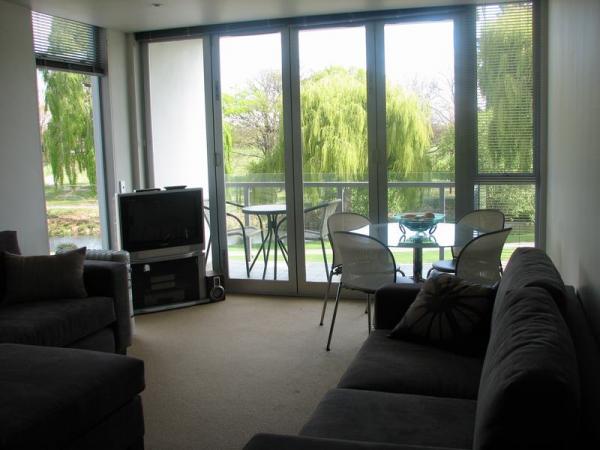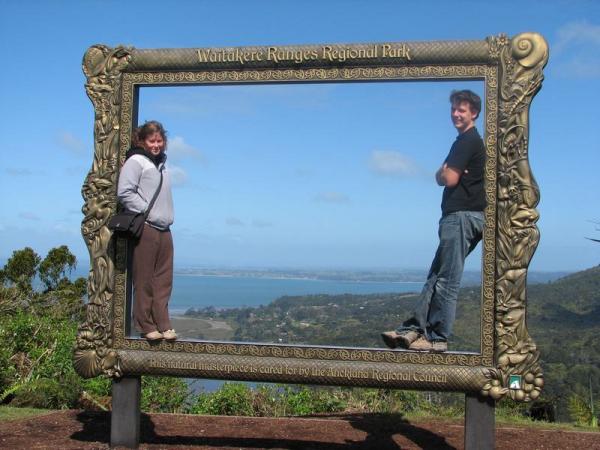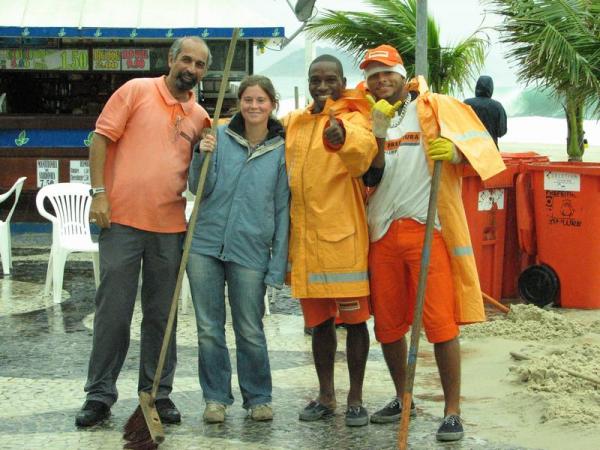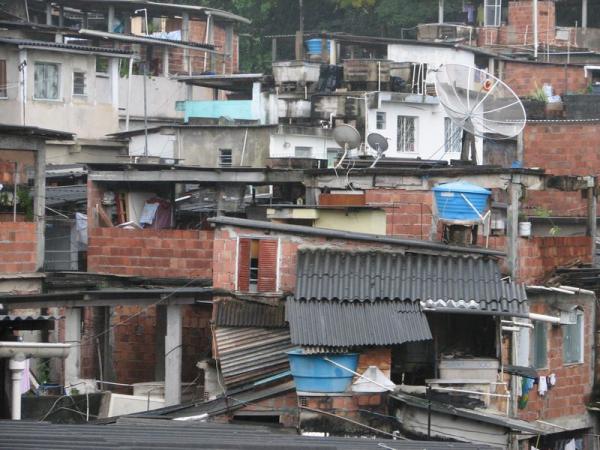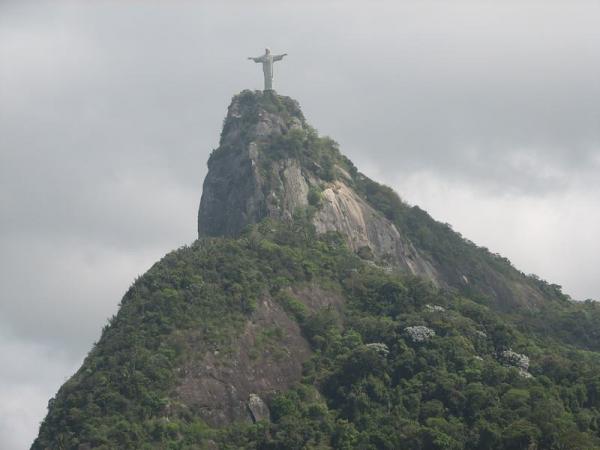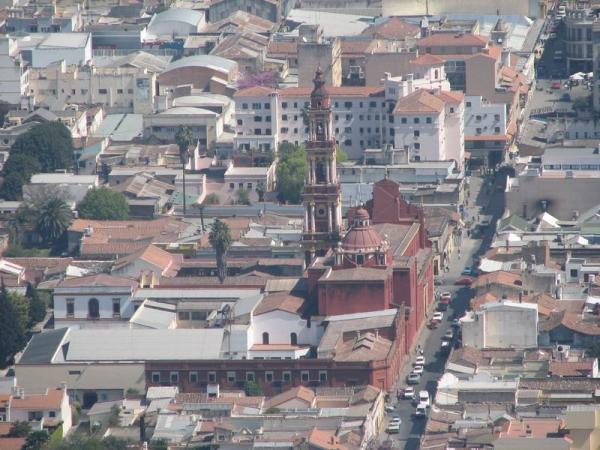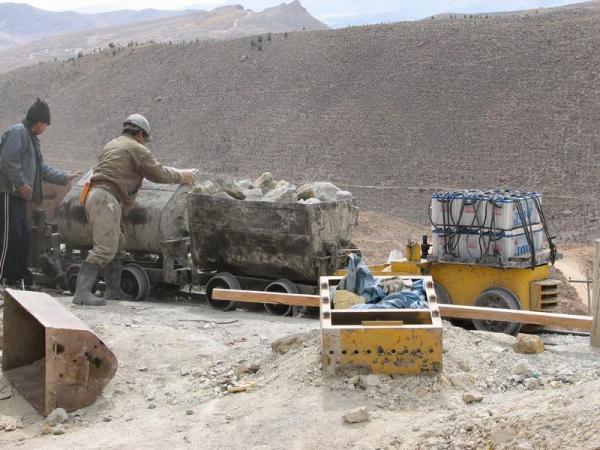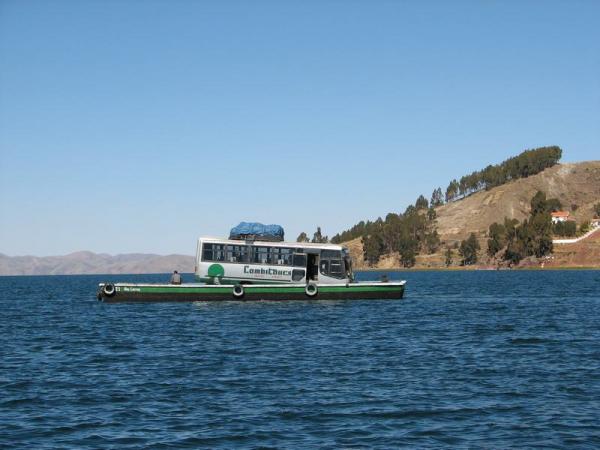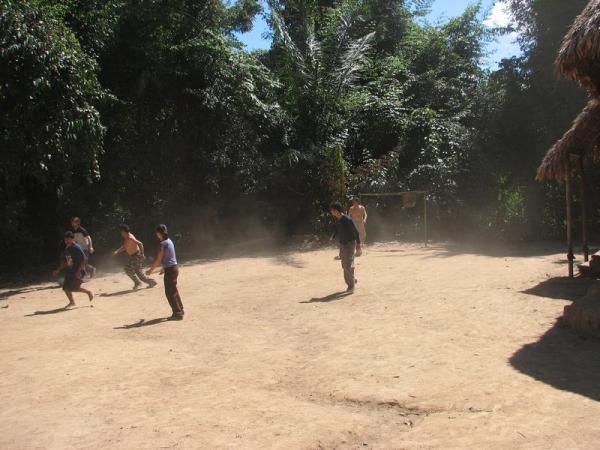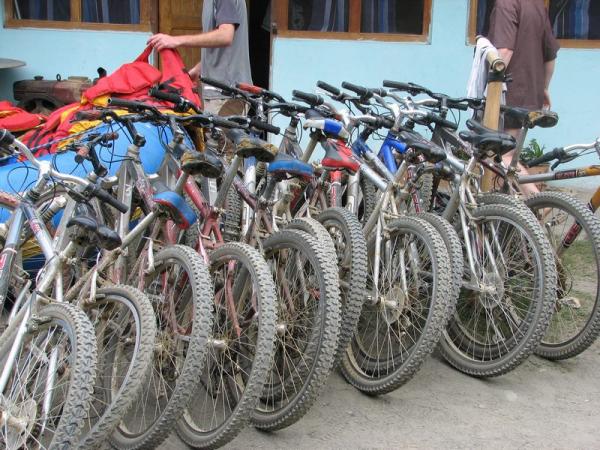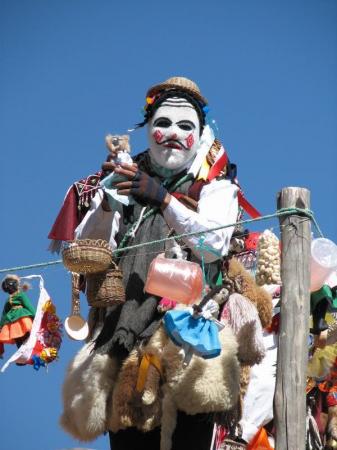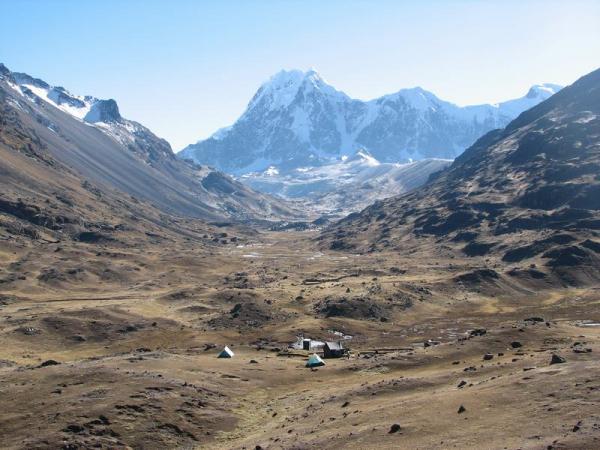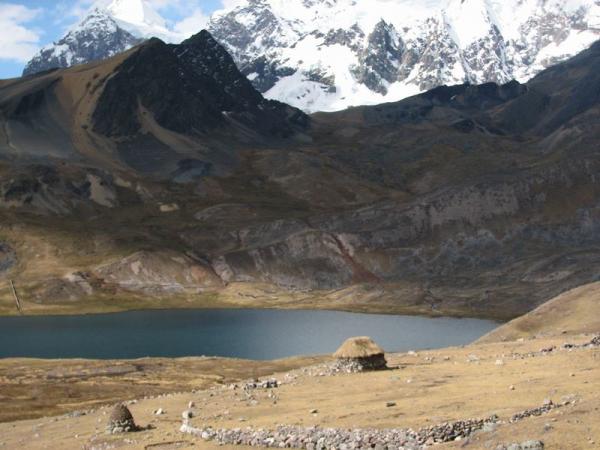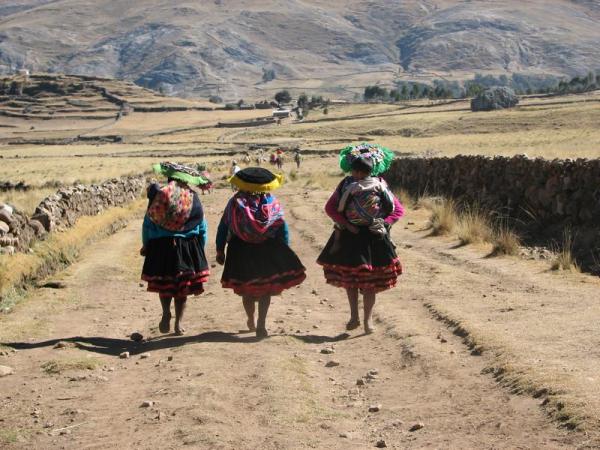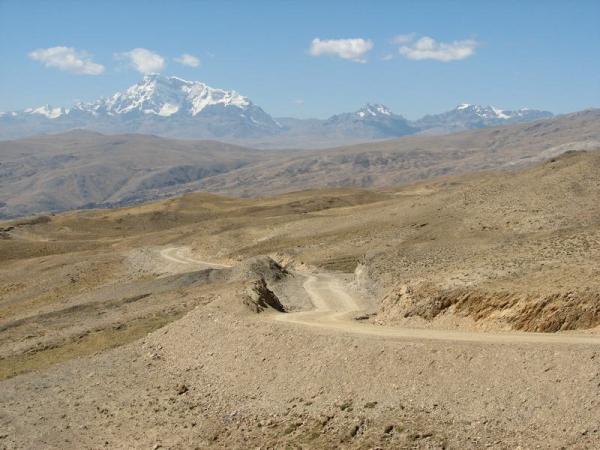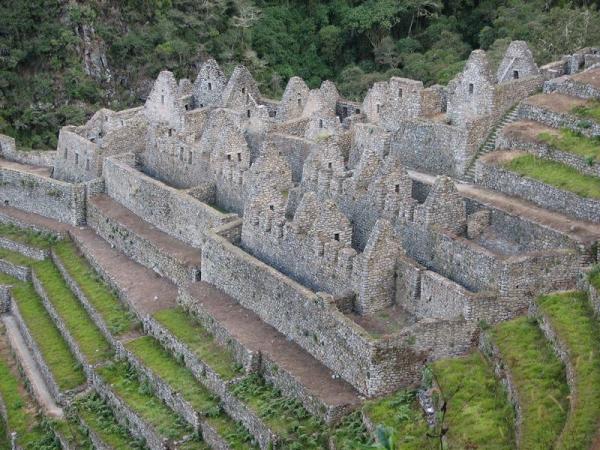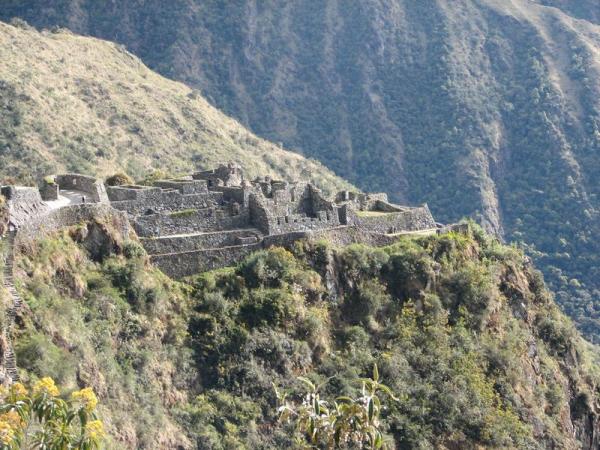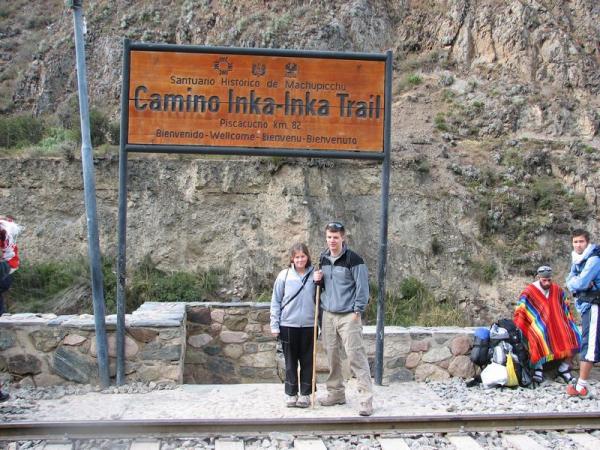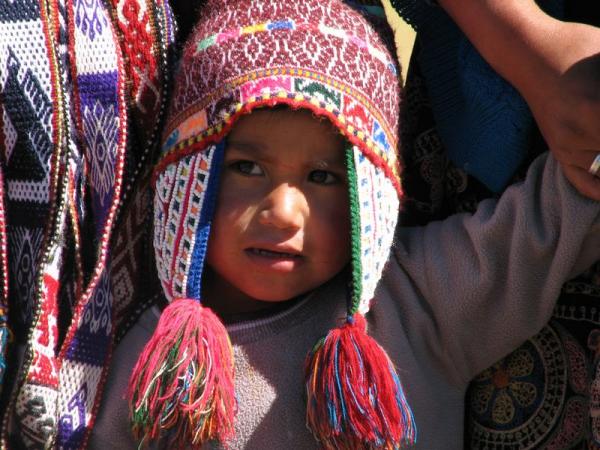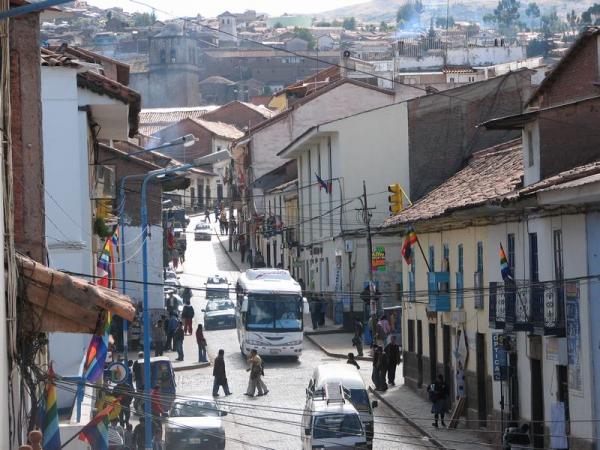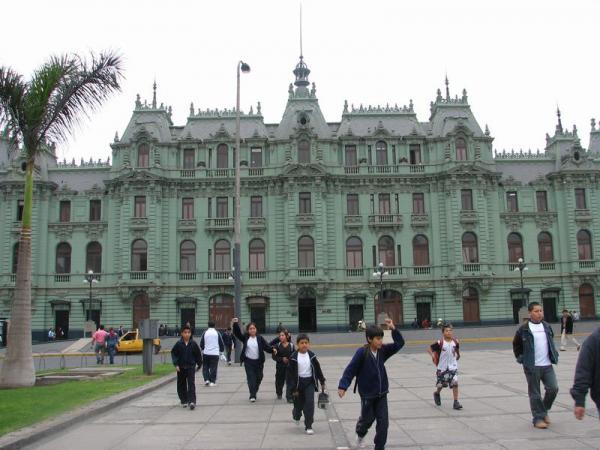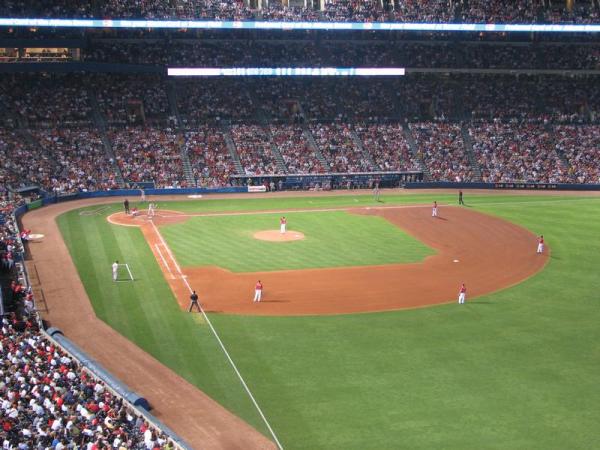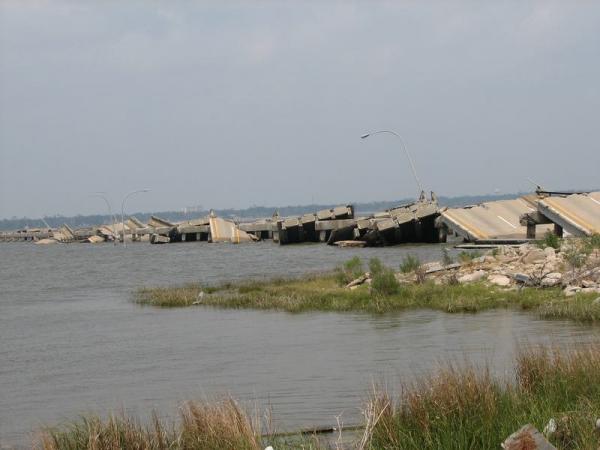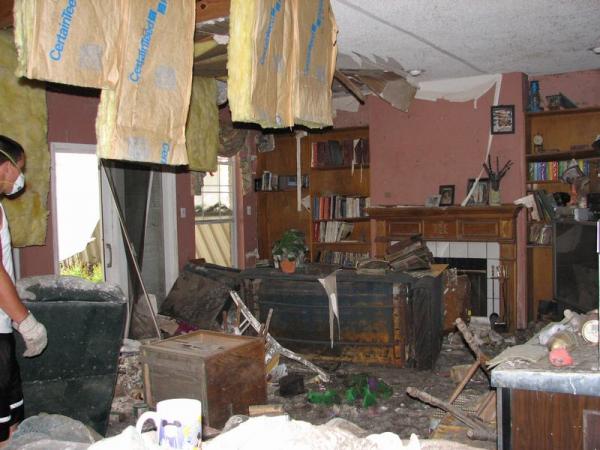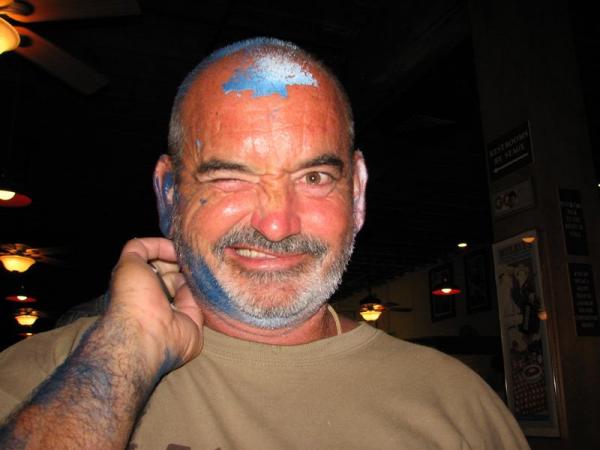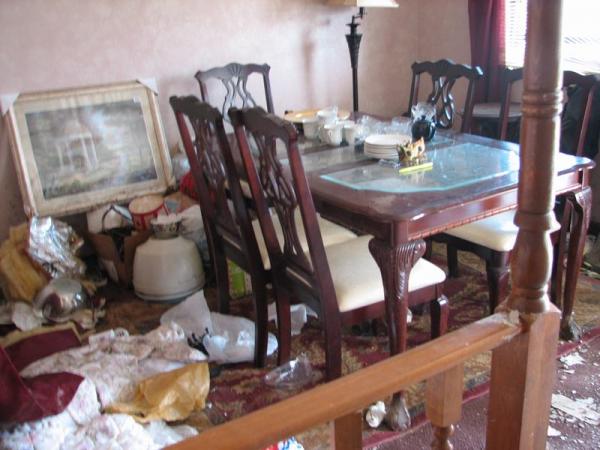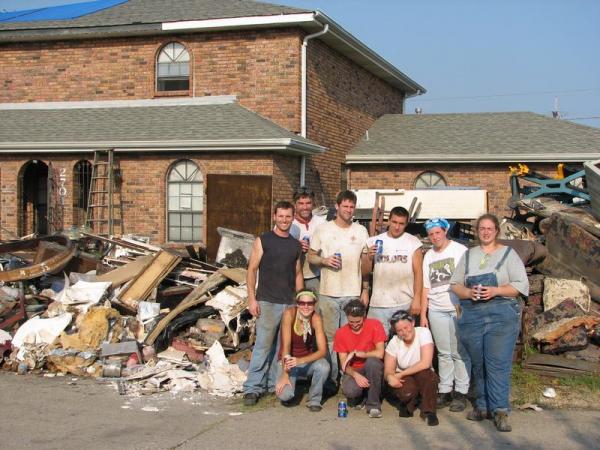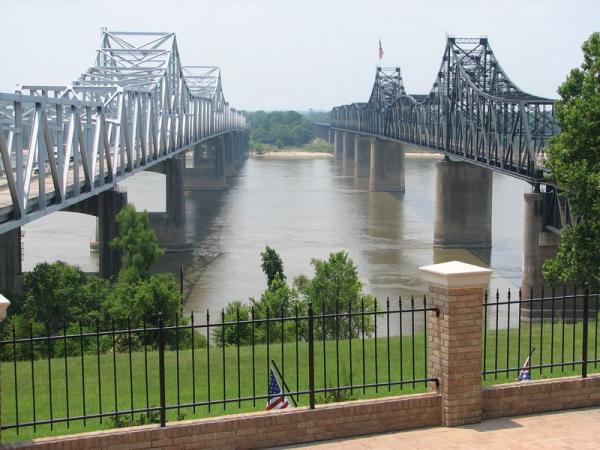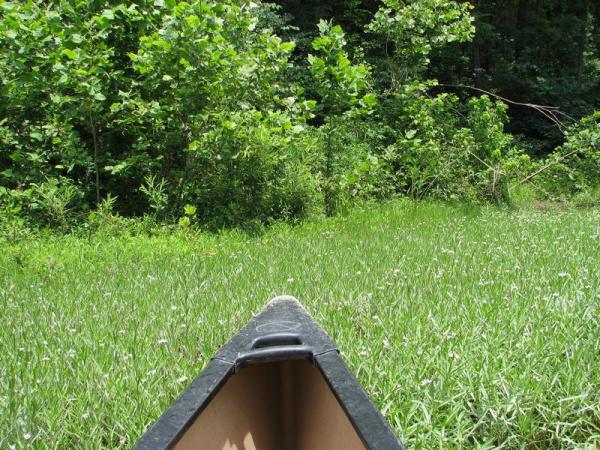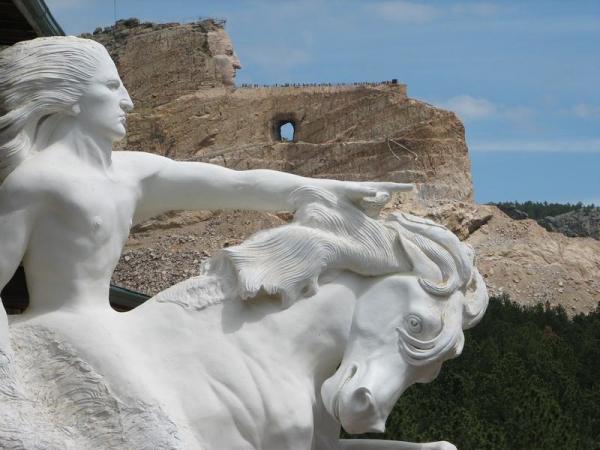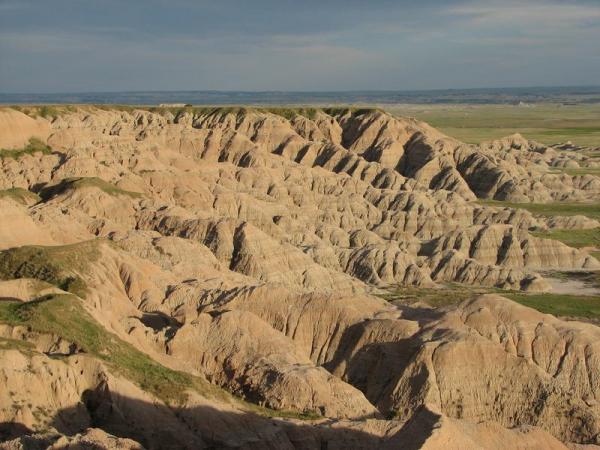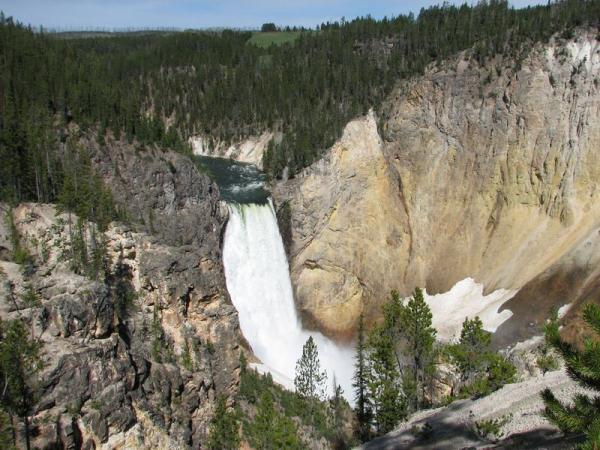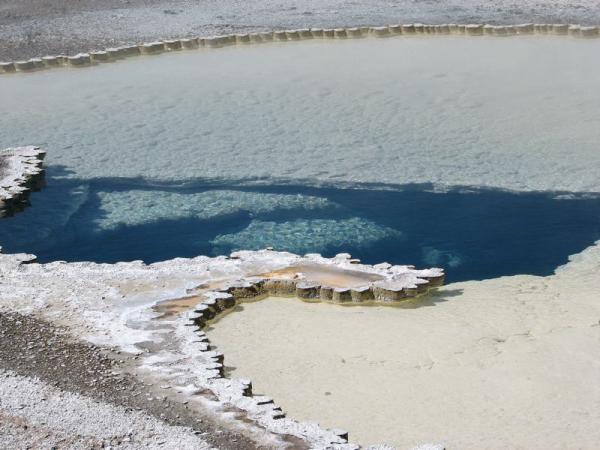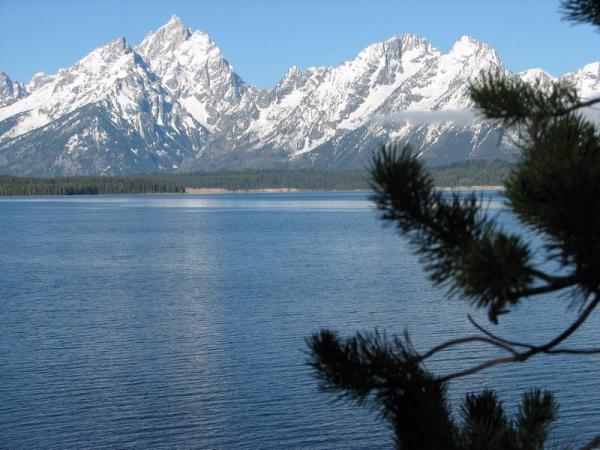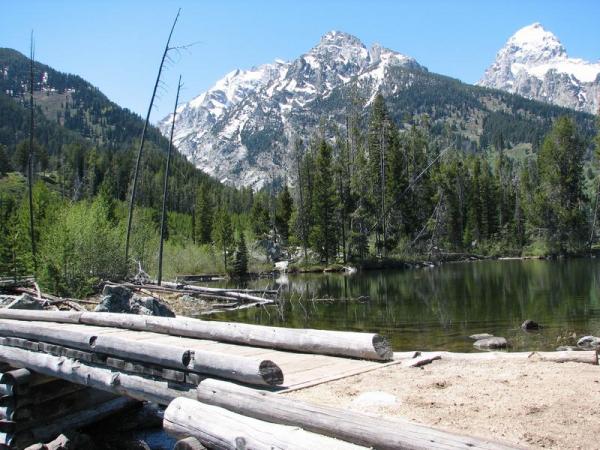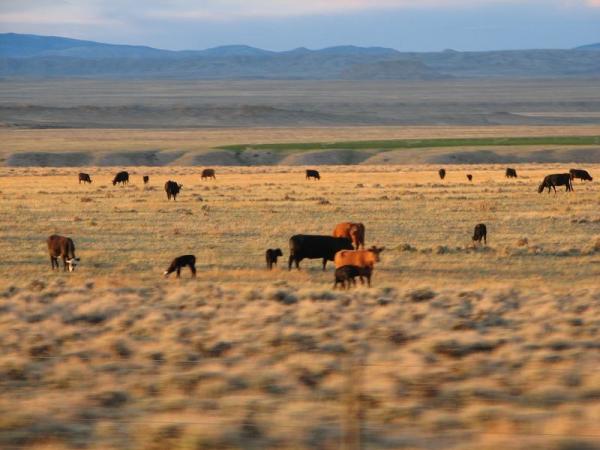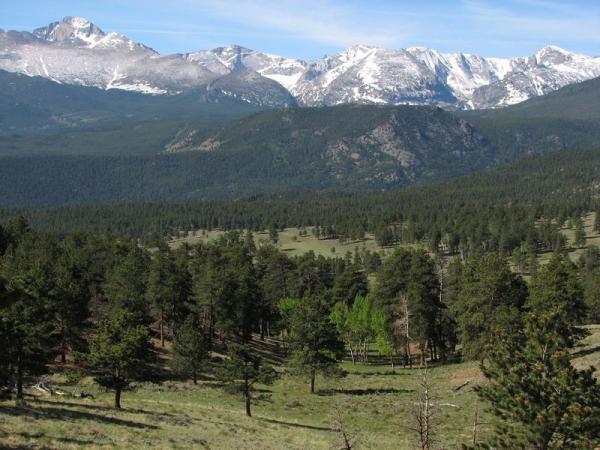Christchurch - Apartment
27th September 2006
H:
Back to real life with a big bang... We arrived in Christchurch on Wednesday night, homeless, carless, jobless, mobileless and computerless. We had been extra organised and had arranged a few recruitment agents meetings each for the following day (Thursday). And staying in a youth hostel while looking for work didn't really feel right to be honest. What was more challenging was finding some clothes in our rucsac that meant we looked fairly presentable. But I got very scared by the thought of one big interview, panicked, and bought a pair of black trousers. It's amazing when combined with an un-ironed top (we had no iron) and a pair of flipflops how presentable you can look! I had taken my whole makeup collection travelling with me (don't panic - it comprises of a mascara and eyeshadow) and have worn it twice while we've been away, but it did come in handy when trying to take attention off the flip flops and creased top...
By Friday we had seen a potential house to move in to, two houses we definitely weren't going to go anywhere near, and had both been offered a job. We thought we had worked hard enough for 2 days and so spent the weekend with my mum's friends from university. They live in the countryside in a beautiful house complete with 20 acres and 100 sheep - which they claim is to save on lawnmowing... We spent Saturday morning running after sheep and trying to get them in the pen. Contrary to popular belief, sheep are actually very clever and just as we thought we'd won, they all jumped over a fence and we had to start again. We (Greg) then spent the next hour running around the pen trying to catch all the lambs so they could be tailed. I'd like to point out that I had no hand in the tailing - I purely acted as the comforter, holding them after G caught them and before Judith tailed them. We have some video of G trying to catch them and I think it would probably win video-of-the-month on 'You've been framed'.
Fortunately fate had intervened and so the weekend came between being offered the job and having to accept it. I had a very near miss and nearly took a job working for an FC of a big big company and doing long hours. Instead I bravely (and more accurately stupidly) turned it down and went back to the recruitment agents saying I had seen the light and wanted to work for a small CA firm. And I have managed to find a really really lovely firm to work for.
By Tuesday night I had got a job and we had signed for a very swish apartment, overlooking the park, complete with pool, gym, sauna and tennis court (although neither of us can play tennis). Infact if you change the map to satellite and zoom in you can just about make out the tennis court. On Wednesday we left our surragate parents and moved into our lovely apartment. Mum summed it up well - it's nice having a front door rather than having a zip...! And G accepted his job. Not bad for a weeks work eh?!
I have found a couple of choirs to try - but none look like they'll match CBSO :o( I did make one big error by emailing someone to see if they had any spaces for a violinist. She emailed back saying yes, and asked for my CV. I've since found out they're a professional orchestra so I've written a grovelling email appologising for not knowing how good they were and she's not replied. So I think my name is already blackened in the Christchurch music world. We have also emailed every sports club in the city asking if they need two netball players with no experience... all the replies so far have have been a no...
Christchurch is such a lovely city. It reminds us both of Cambridge - esp because you can go punting... It's small enough to walk round and we can both walk to work from home. The sea is 20 minutes away, and the snow capped moutains are in the distance :o) The one thing they are bad for is customer service - one girl who when we asked her to phone her manager and see if he would do a discount for developing 2000 photos, she said 'I don't fancy your chances'... Bit of the opposite to America!
Wish us luck for Monday - it's exactly 5 months since we left work so think it's going to be a bit of a shock!!!
CONGRATULATIONS to Tim and Emma too - I am starting to get worried they all don't want me at their weddings...
By Friday we had seen a potential house to move in to, two houses we definitely weren't going to go anywhere near, and had both been offered a job. We thought we had worked hard enough for 2 days and so spent the weekend with my mum's friends from university. They live in the countryside in a beautiful house complete with 20 acres and 100 sheep - which they claim is to save on lawnmowing... We spent Saturday morning running after sheep and trying to get them in the pen. Contrary to popular belief, sheep are actually very clever and just as we thought we'd won, they all jumped over a fence and we had to start again. We (Greg) then spent the next hour running around the pen trying to catch all the lambs so they could be tailed. I'd like to point out that I had no hand in the tailing - I purely acted as the comforter, holding them after G caught them and before Judith tailed them. We have some video of G trying to catch them and I think it would probably win video-of-the-month on 'You've been framed'.
Fortunately fate had intervened and so the weekend came between being offered the job and having to accept it. I had a very near miss and nearly took a job working for an FC of a big big company and doing long hours. Instead I bravely (and more accurately stupidly) turned it down and went back to the recruitment agents saying I had seen the light and wanted to work for a small CA firm. And I have managed to find a really really lovely firm to work for.
By Tuesday night I had got a job and we had signed for a very swish apartment, overlooking the park, complete with pool, gym, sauna and tennis court (although neither of us can play tennis). Infact if you change the map to satellite and zoom in you can just about make out the tennis court. On Wednesday we left our surragate parents and moved into our lovely apartment. Mum summed it up well - it's nice having a front door rather than having a zip...! And G accepted his job. Not bad for a weeks work eh?!
I have found a couple of choirs to try - but none look like they'll match CBSO :o( I did make one big error by emailing someone to see if they had any spaces for a violinist. She emailed back saying yes, and asked for my CV. I've since found out they're a professional orchestra so I've written a grovelling email appologising for not knowing how good they were and she's not replied. So I think my name is already blackened in the Christchurch music world. We have also emailed every sports club in the city asking if they need two netball players with no experience... all the replies so far have have been a no...
Christchurch is such a lovely city. It reminds us both of Cambridge - esp because you can go punting... It's small enough to walk round and we can both walk to work from home. The sea is 20 minutes away, and the snow capped moutains are in the distance :o) The one thing they are bad for is customer service - one girl who when we asked her to phone her manager and see if he would do a discount for developing 2000 photos, she said 'I don't fancy your chances'... Bit of the opposite to America!
Wish us luck for Monday - it's exactly 5 months since we left work so think it's going to be a bit of a shock!!!
CONGRATULATIONS to Tim and Emma too - I am starting to get worried they all don't want me at their weddings...
Auckland - Day 1
17th September 2006
H:
Have made it safely to Auckland and it feels like we're back in England. It was rainy and cold and the skies were grey. But we got on with it anyway and Jackie (a friend of a friend who's looking after us) was our tour guide for a day. To be honest having seen the amount of stuff we've got and got a whiff of our sleeping bags, I think she's starting to regret being so kind. We were going to wait for our boxes but given that NZ customs could take ages, we're flying to Christchurch (where we've decided to live) to start looking for a home and a job and a car and maybe a mobile...
I won't get all philosophical now because our travels are not yet over but the last 4 months have been truely amazing and we have been so so lucky with the amount we have seen and experienced (Iguacu falls excepted).
In the meantime we thought we would list a few world records we've seen...
- Largest and highest salt flats - Salar del Uyuni, Bolivia
- Largest waterfall by volume - Iguacu Falls, Brazil and Argentina - ha, thats a laugh!
- Most dangerous road - La Paz, Bolivia
- Largest urban forest - Rio de Janeiro, Brazil
- Highest microbrewery - La Paz, Bolivia
- Largest lake above 2000m - Lake Titicaca, Peru and Bolivia
- Longest mountain range - The Andes
- Largest rainforest - The Amazon
- Driest desert - Atacama Desert, Chile
- Largest football stadium - Maracana, Brazil
- Highest capital city - La Paz, Bolivia
- One of the largest favelas's - Rio de Janeiro, Brazil
- Largest shopping mall in South America - Rio de Janeiro, Brazil
- Largest rodent - Capybara, Amazon
- Deepest canyon - Colca Canyon, Peru
- Shortest international bridge - 1000 Islands, Canada and USA
- Largest silver mine - Potosi, Bolivia
I won't get all philosophical now because our travels are not yet over but the last 4 months have been truely amazing and we have been so so lucky with the amount we have seen and experienced (Iguacu falls excepted).
In the meantime we thought we would list a few world records we've seen...
- Largest and highest salt flats - Salar del Uyuni, Bolivia
- Largest waterfall by volume - Iguacu Falls, Brazil and Argentina - ha, thats a laugh!
- Most dangerous road - La Paz, Bolivia
- Largest urban forest - Rio de Janeiro, Brazil
- Highest microbrewery - La Paz, Bolivia
- Largest lake above 2000m - Lake Titicaca, Peru and Bolivia
- Longest mountain range - The Andes
- Largest rainforest - The Amazon
- Driest desert - Atacama Desert, Chile
- Largest football stadium - Maracana, Brazil
- Highest capital city - La Paz, Bolivia
- One of the largest favelas's - Rio de Janeiro, Brazil
- Largest shopping mall in South America - Rio de Janeiro, Brazil
- Largest rodent - Capybara, Amazon
- Deepest canyon - Colca Canyon, Peru
- Shortest international bridge - 1000 Islands, Canada and USA
- Largest silver mine - Potosi, Bolivia
Fiji - From Above
10th September 2006 to 15th September 2006
H:
One word: bliss! There's Birmingham made Cadburys at the airport! It's hot and sunny and beautiful and English is the first language so we're now having to remember how to construct sentences together when talking to other people, and not to speak too slowly... The only down side is that my altitude-ically straightened glossy hair is now just one big frizz.
We stayed the first night on the mainland before flying the next day to Taveuni. It was very touristy on the mainland which was going fine, until we met a girl from London who asked if we were from 'Up North' and when we asked her for clarification, she meant north of London. Hmmm... Taveuni is the 4th biggest island but very remote and not very touristy at all. We got on the smallest plane I've ever been on - there were only 10 of us, the pilot and co-pilot - and flew over the islands and coral reefs to Taveuni. The photos speak for themselves...
Congratulations to Tash and Andrew - am starting to loose count of the number of engagements!
And on a more upsetting note - a little bird told me that the recycling rates of the office have plumeted. I don't suppose that would be anything to do with Andrew Marshall coming back from Experian??
We stayed the first night on the mainland before flying the next day to Taveuni. It was very touristy on the mainland which was going fine, until we met a girl from London who asked if we were from 'Up North' and when we asked her for clarification, she meant north of London. Hmmm... Taveuni is the 4th biggest island but very remote and not very touristy at all. We got on the smallest plane I've ever been on - there were only 10 of us, the pilot and co-pilot - and flew over the islands and coral reefs to Taveuni. The photos speak for themselves...
Congratulations to Tash and Andrew - am starting to loose count of the number of engagements!
And on a more upsetting note - a little bird told me that the recycling rates of the office have plumeted. I don't suppose that would be anything to do with Andrew Marshall coming back from Experian??
Fiji - Our
10th September 2006 to 15th September 2006
H:
In an effort to make up for the birthday disaster, Greg had kindly organised it all for us and had found the most beautiful place we could have wished for to stay. It was a traditional bure, set on 2 acres of land, with an amazing view to the sea, infinity deck, hammock... and there was only one bure so it was just us two. Seriously it must be one of the most stunning places we've stayed - and so much better than the posh resorts where your neighbours are just a few feet away. Am worried we're getting a bit anti-social but the peace was lovely! We cooked for ourselves mostly but treated ourselves one night to a local meal where they cook it for you and deliver it to your door - ie our infinity deck :o)
Around Fiji
09th September 2006 to 16th September 2006
H:
I wasn't especially looking forward to 5 days doing nothing as I don't really like lazing around but I think I've changed my mind now. The coral around the islands is amazing so we went snorkeling a few times. Which wasn't a total success - G forgot to put suncream on so he came out to find he was half-lobster and within minutes had called the massage lady for a moisturising treatment... Am thinking about burning my back so I can get one too. Went to the international dateline where you can stand one foot in today and one foot in yesterday. Did a beautiful walk to two waterfalls - and the last bit meant swimming through two pools (hence the lack of photos - sorry!). All in all it was bliss (apart from Greg moaning about his back...).
We couldn't have picked a better place to finish our 4 months of travelling :o)
We couldn't have picked a better place to finish our 4 months of travelling :o)
Rio to Fiji
06th September 2006 to 09th September 2006
H:
Well it carried on raining right until we left so we missed out on hangliding but we really can't complain - we've hardly seen rain since we left England :o)
Then we started on our mammoth journey to Fiji, via Miami for 5 hrs and then LA for 12 hrs. All was going well until we discovered that there was no baggage storage facilities in LA airport. But not to be put off, and definitely not wanting to spend 12 hrs at LA airport, we caught a taxi to the nearest shopping mall. We took it in turns to guard our bags while the other shopped (well window shopped cos we're still on a budget...) and then walked (a very long way with the weight of a not-so-small person on our backs) to the cinema. Where we got a lot of funny looks but managed to watch a film which used up another few hours. We decided to be brave and caught a bus back rather than a taxi, therefore having enough money to order a pizza delivery to the airport. Which surprisingly was not that uncommon...
For the sympathetic of you, we slept in a wooden-matressed bed on Monday night, 'slept' on a plane Wednesday night and Thursday night, missed Friday completely because we crossed the date line, and then finally made it to Fiji on Saturday.
Given that we had a lot of time, we decided to make a list of some things we must remember to do now that we are leaving South America and heading back towards a normal life...
- Speak in English
- Speak in full sentences
- Speak at normal speed
- Don't assume people around you don't speak English
- Remember to drive on the left
- Remember how to use a mobile quicker than my Dad can
- Not to try and flag a bus down in the middle of the street
- Not to ask hotels if they have 24 hours hot water
- Put toilet paper in the loo not the bin
For the sympathetic of you, we slept in a wooden-matressed bed on Monday night, 'slept' on a plane Wednesday night and Thursday night, missed Friday completely because we crossed the date line, and then finally made it to Fiji on Saturday.
Given that we had a lot of time, we decided to make a list of some things we must remember to do now that we are leaving South America and heading back towards a normal life...
- Speak in English
- Speak in full sentences
- Speak at normal speed
- Don't assume people around you don't speak English
- Remember to drive on the left
- Remember how to use a mobile quicker than my Dad can
- Not to try and flag a bus down in the middle of the street
- Not to ask hotels if they have 24 hours hot water
- Put toilet paper in the loo not the bin
Rio - Favela Tour
04th September 2006
H:
Well Tuesday it was still raining but we´re a bit fed up of being cooped up so we decided to do a favela tour. We were a bit unsure about doing one of these because we didn´t want it to just be a voyeuristic tour, looking at someone else´s misery. We were very lucky and had a brilliant guide and it was one of the most interesting tours we´ve done. So here is a geography/sociology/politics lesson for you.
There are about 752 favelas in Rio, and many more across Brazil and South America. Of the 10m people living in Rio City, 20% of these live in favelas, which are mostly on hill sides surrounding the city. They have a reputation of being very bad, poor and violent places, full of drugs. The people of the city of Rio don´t want anything to do with them and are actually very scared of them. Each favela is run by a drug lord, and a heirarchy of men who create their own rules. Everyone in the community must live by these rules or they are punished. Which all sounds very bad but I got the impression that actually these favelas are well run by the drug lords, and they really do care for the people in their communities. They don´t want any trouble because they don´t want there to be any reason for the police to enter the favela. Most of the problems are due to drugs and turf wars.
Rio is known as the `City of Contrasts´ and the drive alone into the favelas showed that. We went first to Vila Canoas - the largest favela in Rio. The entrance to the favela was opposite the most expensive school in Rio. The minimum wage for someone from a favela is R$350 (c£87) a month which is crazy given we´re finding things are at nearly English prices. The school fees are R$1000 a month. And there are expensive houses on the outskirts of all the favelas - many with electrical fences on cameras which our guide thought was unnecessary - would they really steal from a house right outside where they live? We went up to the roof of one house to look out over the favela and just at the bottom of the hill was the beach and a golf course.
The police also cause massive problems. There are look-out boys stationed all over the favelas who set off fireworks if they see a police car enter the favela. Many of the police are corrupt and will take bribes, or shoot unnecessarily. Our guide said we would be perfectly safe on the tour as long as no police entered the favela. If a police car drove in, we would need to get out quickly. How backwards is that?
There are police cars stationed every day at the entrances to the favelas, although what they are there for we´re not sure given how unwelcome they are. And just behind one police car is what´s known as the `drive through´ drug alley where the middle class people from the city (including apparently many people in high places) go to get their drugs, without having to enter too far into the favela.
We asked how the people of the favelas felt about us being there and she said they encouraged it. Many of them want to be more accepted by the people of Rio, and this may be one way of helping that. It also helps them as some of them who can´t read or write, are picking up odd words of English and French and it is one of the few chances they have to meet people of a different culture. Our guide said she often felt safer walking through a favela than down the beach at Copacabana. The bad people from the favelas do not steal from others there as they are also poor, but instead come down into the city and steal from people living there.
The favelas are also in a strange way, very nice to look at. They couldn´t be designed - they are too intricate. They have grown from a few houses scattered around, to being hap-hazard rooms being built on top of each other, and in spaces. There are no spaces for roads, just some steps going up and down between the rooms. In the second favela we went to (Rocinha, who share the same drug lord as Vila Canoas) we walked for a while through the favela. It would be so so easy to get lost if you didn´t know the way - there were steps leading everywhere and in many places it felt like you were walking through a tunnel or underground passageway.
It seems that these places just need help and input from the government. It sounds like they just close their eyes to many of the problems and so they just get worse. There are infact a lot of very talented people who live in the favelas, who don´t have the chances and opportunities to make something of themselves. A local actor did a few acting classes in the favelas which were so popular that there is now a little drama school there. And many of the actors for the film City of God, were taken from the favelas. Many famous footballers started life in the favelas, including Ronaldo, Romario and Dunga (I´d only heard of the first guy).
To show the corruption, somehow when people are arrested and put in jail, others from their favela bribe officials to let them have a mobile phone or visitors. Apparently all the violence in Sao Paulo is being run by the main drug lord of the area, who is currently in a ¨maximum security¨ prison...
Ok, am now off the soap box...
There are about 752 favelas in Rio, and many more across Brazil and South America. Of the 10m people living in Rio City, 20% of these live in favelas, which are mostly on hill sides surrounding the city. They have a reputation of being very bad, poor and violent places, full of drugs. The people of the city of Rio don´t want anything to do with them and are actually very scared of them. Each favela is run by a drug lord, and a heirarchy of men who create their own rules. Everyone in the community must live by these rules or they are punished. Which all sounds very bad but I got the impression that actually these favelas are well run by the drug lords, and they really do care for the people in their communities. They don´t want any trouble because they don´t want there to be any reason for the police to enter the favela. Most of the problems are due to drugs and turf wars.
Rio is known as the `City of Contrasts´ and the drive alone into the favelas showed that. We went first to Vila Canoas - the largest favela in Rio. The entrance to the favela was opposite the most expensive school in Rio. The minimum wage for someone from a favela is R$350 (c£87) a month which is crazy given we´re finding things are at nearly English prices. The school fees are R$1000 a month. And there are expensive houses on the outskirts of all the favelas - many with electrical fences on cameras which our guide thought was unnecessary - would they really steal from a house right outside where they live? We went up to the roof of one house to look out over the favela and just at the bottom of the hill was the beach and a golf course.
The police also cause massive problems. There are look-out boys stationed all over the favelas who set off fireworks if they see a police car enter the favela. Many of the police are corrupt and will take bribes, or shoot unnecessarily. Our guide said we would be perfectly safe on the tour as long as no police entered the favela. If a police car drove in, we would need to get out quickly. How backwards is that?
There are police cars stationed every day at the entrances to the favelas, although what they are there for we´re not sure given how unwelcome they are. And just behind one police car is what´s known as the `drive through´ drug alley where the middle class people from the city (including apparently many people in high places) go to get their drugs, without having to enter too far into the favela.
We asked how the people of the favelas felt about us being there and she said they encouraged it. Many of them want to be more accepted by the people of Rio, and this may be one way of helping that. It also helps them as some of them who can´t read or write, are picking up odd words of English and French and it is one of the few chances they have to meet people of a different culture. Our guide said she often felt safer walking through a favela than down the beach at Copacabana. The bad people from the favelas do not steal from others there as they are also poor, but instead come down into the city and steal from people living there.
The favelas are also in a strange way, very nice to look at. They couldn´t be designed - they are too intricate. They have grown from a few houses scattered around, to being hap-hazard rooms being built on top of each other, and in spaces. There are no spaces for roads, just some steps going up and down between the rooms. In the second favela we went to (Rocinha, who share the same drug lord as Vila Canoas) we walked for a while through the favela. It would be so so easy to get lost if you didn´t know the way - there were steps leading everywhere and in many places it felt like you were walking through a tunnel or underground passageway.
It seems that these places just need help and input from the government. It sounds like they just close their eyes to many of the problems and so they just get worse. There are infact a lot of very talented people who live in the favelas, who don´t have the chances and opportunities to make something of themselves. A local actor did a few acting classes in the favelas which were so popular that there is now a little drama school there. And many of the actors for the film City of God, were taken from the favelas. Many famous footballers started life in the favelas, including Ronaldo, Romario and Dunga (I´d only heard of the first guy).
To show the corruption, somehow when people are arrested and put in jail, others from their favela bribe officials to let them have a mobile phone or visitors. Apparently all the violence in Sao Paulo is being run by the main drug lord of the area, who is currently in a ¨maximum security¨ prison...
Ok, am now off the soap box...
Rio - Corcavado
03rd September 2006
H:
Well its turning out to be a great end to the South American bit of our trip - it´s still raining!
We arrived Friday and it rained. And then Saturday it rained. But it cleared up in the evening so we went to the Maracana (for most of the girls/non-football mad men reading this it´s the biggest stadium in the world and apparently it´s a really big thing to go there) to watch Flamengo play International. It was quite good actually - mainly because I can´t speak Spanish and don´t know when people are swearing around me. It wasn´t full but the atmosphere was brilliant - lots of chanting and samba playing all the way through.
Congratulations to Lou, Oz and Bubba (now called Dylan). While we were moping in the rain, Lou gave birth to Dylan Elliot Osbourne who weighed 6lb 11.
Then on Sunday it looked really nice so we decided to go up to the man-on-the-hill (Christ the Redeemer) which is another sight I´ve wanted to see for years and years and years. So we went up and just as we got to the top the sky turned grey and ruined the great view from the top :o( We had read that Brazil, esp Rio, was full of beautiful people. We expected to see a lot of people in `beach wear´ but thought that might be limited to the beach. We weren´t quite prepared for seeing so many men (and a lot of them older men) walking around in speedos. Never mind going up to see the Christ the Redeemer in JUST a pair of speedos! Sexy or what girls??! And he must have frozen when the rain came down!!
Greg seems to be a bit subdued with all the rain and I´m not being subjected to half the number of ´her name was Lola´ renditions I expected, although there have been a few ´her name was Rio and she dances on the sand´ performances. But as with the Lola song he only knows that one line...
Congratulations to Lou, Oz and Bubba (now called Dylan). While we were moping in the rain, Lou gave birth to Dylan Elliot Osbourne who weighed 6lb 11.
Then on Sunday it looked really nice so we decided to go up to the man-on-the-hill (Christ the Redeemer) which is another sight I´ve wanted to see for years and years and years. So we went up and just as we got to the top the sky turned grey and ruined the great view from the top :o( We had read that Brazil, esp Rio, was full of beautiful people. We expected to see a lot of people in `beach wear´ but thought that might be limited to the beach. We weren´t quite prepared for seeing so many men (and a lot of them older men) walking around in speedos. Never mind going up to see the Christ the Redeemer in JUST a pair of speedos! Sexy or what girls??! And he must have frozen when the rain came down!!
Greg seems to be a bit subdued with all the rain and I´m not being subjected to half the number of ´her name was Lola´ renditions I expected, although there have been a few ´her name was Rio and she dances on the sand´ performances. But as with the Lola song he only knows that one line...
Iguazu Falls
30th August 2006 to 31st August 2006
H:
What a disaster!!! I know its greedy and selfish and I want it all but this was so depressing! I’ve wanted to see Iguaçu falls for years and years and years and us finally getting there coincides with a drought in Brazil and so most of the 275 different waterfalls that make up Iguaçu are dry :o( After a 26 hr bus ride from Salta we end up at Puerto Iguaçu – the town on the Argentinean side. So we found a bus to take us over to Brazil but that ditched us at the Brazilian border in the middle of nowhere so we had to wait for another bus to take us to Foz de Iguaçu. And then our first sight of the falls on the Brazilian side is just a big brown wall which is normally covered in water. So that didn’t put us off to a very good start. But then we went further round to the `Devil’s Throat´ and there’s still quite a lot of water going over that so it was quite impressive. And hey – at least it’s warm here. But I have been getting very cross when I see people watering the grass – are the falls not more important than some green grass???
But then the following day we went back to Argentina for the day (another 2 stamps in my passport) and went to see the falls from their side. And it’s here that I want to thank you all for praying/keeping fingers crossed for rain. Because just as we got there the skies opened and it tipped it down. And we got soaked and had no rain coats and couldn’t afford the ones the park were selling. We did attempt the 2k walk out to the top of the Devils throat and it was well worth it – not sure the pictures really show the power of the water going over there. But I do wonder why they haven’t got procedures in place to divert some of the water to go over all the other bits??! Maybe will leave it in the suggestions box… So we were soggy for the whole day and had to sack it in because the rest of the walks involved walking about 10ks in the rain. And we were already wet and cold. So thank you everybody but it was too little (well it was quite a lot really) too late!!!!
Ps: for those still anxious about the whereabouts of the Cadburys it’s now safely back in my rucksac.
But then the following day we went back to Argentina for the day (another 2 stamps in my passport) and went to see the falls from their side. And it’s here that I want to thank you all for praying/keeping fingers crossed for rain. Because just as we got there the skies opened and it tipped it down. And we got soaked and had no rain coats and couldn’t afford the ones the park were selling. We did attempt the 2k walk out to the top of the Devils throat and it was well worth it – not sure the pictures really show the power of the water going over there. But I do wonder why they haven’t got procedures in place to divert some of the water to go over all the other bits??! Maybe will leave it in the suggestions box… So we were soggy for the whole day and had to sack it in because the rest of the walks involved walking about 10ks in the rain. And we were already wet and cold. So thank you everybody but it was too little (well it was quite a lot really) too late!!!!
Ps: for those still anxious about the whereabouts of the Cadburys it’s now safely back in my rucksac.
Argentinian Road Trip
26th August 2006 to 28th August 2006
H:
Today we hired a car for 3 days so have had to put everything in our rucsacs again and set off driving south. Which was all fine until we realised we'd left the Cadburys back in Salta. OH NO! THE Cadburys that has been with us since Peru and has travelled for 2 months through 4 countries... and that I was kind enough not to open on my birthday as planned because Greg was ill. Bugger. So we had to turn round and go back to the town we'd just passed, find an internet and search for the hotel phone number and then phone them up, explain where it was and ask them to save it for us! I am fairly sure the receptionist (who thank God spoke English) thought it slightly odd that two people could be so anxious about a bar of chocolate!!!
Other than that, the last couple of days have been great! To make a change the scenery is stunning and the car is no jeep but it's not too bad. Although I keep reaching for the window winder instead of the gear stick - the jeep we had in America was automatic... And Greg is still forgetting the clutch on day 3...
Other than that, the last couple of days have been great! To make a change the scenery is stunning and the car is no jeep but it's not too bad. Although I keep reaching for the window winder instead of the gear stick - the jeep we had in America was automatic... And Greg is still forgetting the clutch on day 3...
Salta
21st August 2006 to 25th August 2006
H:
It feels like we've driven into Europe! Houses are now made of real bricks, there's tarmac on the road, street lights, road signs, babies are pushed in buggies rather than carried in a bundle of cloths on their mums back, and they even have Ford Fiesta's here!
Found a lovely hotel to celebrate my birthday... but Greg's still not feeling well. In fact the day of my birthday he woke up feeling extremely ill so we had to call the doctor out. In our limited spanish and a lot of sign language, we explained the symptoms and the doctor said he wanted to give him an injection. Greg doesn't really like needles but bravely held out his arm anyway. And in the doctor's limited English and a lot of sign language he explained he needed the bum not the arm! I'm fairly sure at that point I would have refused said injection (especially as we didn't know (and still don't) what they were injecting him with) but he bravely said ok... Now I don't know about you, but to me that seems like great lengths to go to to get out of being in trouble for not having got me a card or present...
We originally planned to stay in our nice hotel for 3 nights but during the week convinced ourselves that somehow we could afford to stay there for 6 nights... It had a small kitchen so meant we could have some much needed home cooking too. It´s funny - we´ve been away for nearly 4 months, driven ourselves 5000 miles round America, been on some buses that wouldn´t pass their MOT in England, lived at altitude with freezing temperatures for two months, cycled the world's most dangerous road... and the closest we´ve come to being injured is here where Greg decided to cook the hobs cable as well as our food! Really haven't done much here in Salta at all which has been very nice - and we even managed to find a cinema with films in English :o) Home comforts eh!! For those who are still concerned Greg is better now - the mysterious illness disappeared once my birthday was safely over...
Congratulations to Naomi and Gary! No date decided yet but we're hoping it might coincide (but not clash) with everyone else's!!
Found a lovely hotel to celebrate my birthday... but Greg's still not feeling well. In fact the day of my birthday he woke up feeling extremely ill so we had to call the doctor out. In our limited spanish and a lot of sign language, we explained the symptoms and the doctor said he wanted to give him an injection. Greg doesn't really like needles but bravely held out his arm anyway. And in the doctor's limited English and a lot of sign language he explained he needed the bum not the arm! I'm fairly sure at that point I would have refused said injection (especially as we didn't know (and still don't) what they were injecting him with) but he bravely said ok... Now I don't know about you, but to me that seems like great lengths to go to to get out of being in trouble for not having got me a card or present...
We originally planned to stay in our nice hotel for 3 nights but during the week convinced ourselves that somehow we could afford to stay there for 6 nights... It had a small kitchen so meant we could have some much needed home cooking too. It´s funny - we´ve been away for nearly 4 months, driven ourselves 5000 miles round America, been on some buses that wouldn´t pass their MOT in England, lived at altitude with freezing temperatures for two months, cycled the world's most dangerous road... and the closest we´ve come to being injured is here where Greg decided to cook the hobs cable as well as our food! Really haven't done much here in Salta at all which has been very nice - and we even managed to find a cinema with films in English :o) Home comforts eh!! For those who are still concerned Greg is better now - the mysterious illness disappeared once my birthday was safely over...
Congratulations to Naomi and Gary! No date decided yet but we're hoping it might coincide (but not clash) with everyone else's!!
San Pedro de Atacama - Chile
18th August 2006 to 20th August 2006
H:
What a difference in border crossings to that between Peru and Bolivia! The Bolivian exit is right in the middle of the desert, and from here we got a bus to San Pedro de Atacama where the Chilean entry border is. We had to have our shoes disinfected, and then all our bags checked for illegal items - we think they're mainly looking for coca leaves. The leaves are used and sold freely in Peru and Bolivia - a lot of people chew them and Coca tea is a very common drink there (I hate it but G thinks its ok) because its meant to help with the altitude. But Chile and Argentina won't let them in even in their leaf form, I guess the risk is people will turn them into cocaine. By the way, did you know that Coca Cola used to have a coca leaf in it until it was banned??
So 2 hours later... we made it to the little village right on the edge of the desert, and were horrified to see the prices! It's a tiny little place but everything is nearly at English prices so we've opted for a shared room in a hostel with a couple we met on the tour, and are going to be living off bread for a couple of days... And there are a lot of 0's - ie a bag of crisps is $1250!! G's still not feeling well so I have been mean and left him in bed while the other 3 of us went on a half day tour of the lunar and death valleys. Apparently the landscape is considered to be so similar to the moon that NASA test their equipment there before they send it into space! The landscape is beautiful (again), flat desert, a little oasis (San Pedro) and all this surrounded by mountains and volcanoes.
So 2 hours later... we made it to the little village right on the edge of the desert, and were horrified to see the prices! It's a tiny little place but everything is nearly at English prices so we've opted for a shared room in a hostel with a couple we met on the tour, and are going to be living off bread for a couple of days... And there are a lot of 0's - ie a bag of crisps is $1250!! G's still not feeling well so I have been mean and left him in bed while the other 3 of us went on a half day tour of the lunar and death valleys. Apparently the landscape is considered to be so similar to the moon that NASA test their equipment there before they send it into space! The landscape is beautiful (again), flat desert, a little oasis (San Pedro) and all this surrounded by mountains and volcanoes.
South West Bolivia
17th August 2006 to 18th August 2006
H:
Hmmm. (a) we started at 5.30am, (b) food is shit and (c) its bloody freezing! Took at least 2 hours to feel all 10 toes... Today we drove through some amazing landscapes - desert-y but to a point of looking Mars-y. Saw some beautiful lakes and mountains and volcanoes (one of which was smoking). Also saw lots of flamingos which was very exciting as we hadn't seen any wild ones before. Don't think they're true flamingos though because none of them were standing on one leg...
Should have realised tonight was going to be bad when our driver started rushing us, saying we had to be at the hostel first to get an ok room... The huts we were aiming for were miles and miles from any civilisation. Turns out we were late and couldn't stay in the nice one (which I promise didn't look that great) and instead went to the next door hut to stay there. And it was terrible! Really cold, no heating, no hot water, or water actually after 9pm... And then I got one of my lovely eyeache/headache/migrane things so was in 'bed' (if you can call it that) by 6pm with a hot water bottle someone leant me. And then the guide felt sorry for me and magic-ed up a gas heater (so tip for next cold trip: feign illness and get a heater) so at least we were warm-ish... Only 18hrs until we're in Chile next to the desert and 2000m lower (ie warmer)...
Day 3: Well at least we’ve survived the night in what apparently is one of the harshest landscapes in the world. But we’re really really really really cold. We're wearing all our clothes and have still got our sleeping bags on in the jeep... Toes are really hurting which is weird given I can't feel them. Greg's not feeling too good – some sort of “Man Flu”. Saw some geysers in the dark but couldn't drag ourselves out the car to see them... Stopped at a beautiful lake complete with hot springs for breakfast (if you can call it that - dry bread) where some people bravely stripped and got in. We were sensible and kept our 7 layers on...
Congratulations Nessa on your A-level results :o)
Should have realised tonight was going to be bad when our driver started rushing us, saying we had to be at the hostel first to get an ok room... The huts we were aiming for were miles and miles from any civilisation. Turns out we were late and couldn't stay in the nice one (which I promise didn't look that great) and instead went to the next door hut to stay there. And it was terrible! Really cold, no heating, no hot water, or water actually after 9pm... And then I got one of my lovely eyeache/headache/migrane things so was in 'bed' (if you can call it that) by 6pm with a hot water bottle someone leant me. And then the guide felt sorry for me and magic-ed up a gas heater (so tip for next cold trip: feign illness and get a heater) so at least we were warm-ish... Only 18hrs until we're in Chile next to the desert and 2000m lower (ie warmer)...
Day 3: Well at least we’ve survived the night in what apparently is one of the harshest landscapes in the world. But we’re really really really really cold. We're wearing all our clothes and have still got our sleeping bags on in the jeep... Toes are really hurting which is weird given I can't feel them. Greg's not feeling too good – some sort of “Man Flu”. Saw some geysers in the dark but couldn't drag ourselves out the car to see them... Stopped at a beautiful lake complete with hot springs for breakfast (if you can call it that - dry bread) where some people bravely stripped and got in. We were sensible and kept our 7 layers on...
Congratulations Nessa on your A-level results :o)
Salar de Uyuni
16th August 2006 to 17th August 2006
H:
Well you know you’re getting travel weary when you are a little apprehensive about booking on another tour! We’re having less and less energy to deal with the (a) early starts, (b) the food which is normally rice and mush and (c) the cold. And we've heard from everyone who's been that it's freezing cold and can get down to -15 degrees. So perfect conditions for me...
We’ve booked a 3 day salt flat tour but this morning decided we wanted to end up in Chile, rather than spend 8 hrs in a van going back to Uyuni where the tour starts from. Fortunately Bolivians aren't as uptight as the English (who would charge a cancellation fee, rebooking fee plus admin fee) and they changed our trip for free!
Uyuni is a really strange place - the bus from Potosi went through hours of mountains and then suddenly came to this massive flat open plain which was exciting as we haven’t seen much flat since America!
Day 1 was quite easy - didn't start until 11am so I only had issue (b) and (c) left to deal with...! There were 7 of us crammed in a jeep along with the driver (who also acts as mechanic, cook and guide). We started at a train graveyard and then drove (in what seemed like a 40-jeep convoy) across the salt flats. The salt flats are very bizarre - basically as far as you can see of flat white salt! We stopped for lunch at the 'fish island' which is basically just an outcrop of real land, in the middle of all this salt! The lunch confirmed issue (b) - cold pasta with no sauce so we had to make do with cold pasta and improvised with tomato sauce... We then continued to the edge of the flats to the salt hotel where we were staying the night. Yes - its a 'hotel' made of salt, with tables and chairs and even the bed made out of salt blocks. Thank God it's not an ice hotel - I don't think I would have survived... Fortunately somehow it really wasn't that cold tonight - ie I still had one spare fleece that I could have put on but didn´t need...
We’ve booked a 3 day salt flat tour but this morning decided we wanted to end up in Chile, rather than spend 8 hrs in a van going back to Uyuni where the tour starts from. Fortunately Bolivians aren't as uptight as the English (who would charge a cancellation fee, rebooking fee plus admin fee) and they changed our trip for free!
Uyuni is a really strange place - the bus from Potosi went through hours of mountains and then suddenly came to this massive flat open plain which was exciting as we haven’t seen much flat since America!
Day 1 was quite easy - didn't start until 11am so I only had issue (b) and (c) left to deal with...! There were 7 of us crammed in a jeep along with the driver (who also acts as mechanic, cook and guide). We started at a train graveyard and then drove (in what seemed like a 40-jeep convoy) across the salt flats. The salt flats are very bizarre - basically as far as you can see of flat white salt! We stopped for lunch at the 'fish island' which is basically just an outcrop of real land, in the middle of all this salt! The lunch confirmed issue (b) - cold pasta with no sauce so we had to make do with cold pasta and improvised with tomato sauce... We then continued to the edge of the flats to the salt hotel where we were staying the night. Yes - its a 'hotel' made of salt, with tables and chairs and even the bed made out of salt blocks. Thank God it's not an ice hotel - I don't think I would have survived... Fortunately somehow it really wasn't that cold tonight - ie I still had one spare fleece that I could have put on but didn´t need...
Potosi
14th August 2006 to 15th August 2006
H:
After what was actually an alright overnight bus ride, we arrived in Potosi at 6.30am. We tried to be real travellers so stubbornly decided to walk from the bus station to the town centre which was up a hill and with all our bags... We stopped by a tour agency on the way and at 7.45 booked a trip to
go see the mines at 8.15...! So it was a bit of a rush but managed breakfast of sorts and to get changed in half an hour.
Potosi is famous for its silver mines. There´s a big mountain next to the town that has been mined for the last 500 years and they are still finding minerals there. I´m not sure exactly why these mines are such a tourist attraction other than because the conditions that the miners work in are so horrendous. I stupidly did some research on the internet before we got there and scared myself before we even booked the tour. The mine is apparently 4 years overdue collapsing and there are also a lot of toxic gasses. The miners don´t have proper equipment - and I didn´t see one wearing a mask. Which then explains why the life expectancy of a miner is between 35 and 40 which is horrendous. There were some statistics up inside the mine which showed that about 90% of the workers worked there due to lack of other job opportunities. Only 5% worked there because they wanted to.
we got kitted out in our mine gear and we´d managed to find some paper masks in La Paz so we were as prepared as we could be. We stopped at a road known as the ´Miner´s street´ to buy some dynamite (yes just like that!) a fuse and some drink for the miners. A couple of guys in our group then went off to find a toy doll that the guide said he would blow up for us after the tour...
We started the tour into the mines but after about half an hour everyone was coughing and sneezing - including us with our masks on so having come to the conclusion that they probably weren´t working - I decided to come out. Greg braved it though and went with the rest of the group down to the bottom level where apparently it was boiling. They saw a lot of miners who do the explosions at night, and then return the next day to shovel all the rocks into the carts to take outside. There were a lot of tight squeezes and I think G came to the same conclusion as everyone else - the conditions are not good!!
90 minutes later the rest of the group came out and set about pulling various limbs off the doll they bought to get the dynamite inside. It was a very very loud explosion and no-one could find any doll parts afterwards... I certainly would not want to be inside the mine when they did that - the roof looked fragile enough as it was!
Potosi is famous for its silver mines. There´s a big mountain next to the town that has been mined for the last 500 years and they are still finding minerals there. I´m not sure exactly why these mines are such a tourist attraction other than because the conditions that the miners work in are so horrendous. I stupidly did some research on the internet before we got there and scared myself before we even booked the tour. The mine is apparently 4 years overdue collapsing and there are also a lot of toxic gasses. The miners don´t have proper equipment - and I didn´t see one wearing a mask. Which then explains why the life expectancy of a miner is between 35 and 40 which is horrendous. There were some statistics up inside the mine which showed that about 90% of the workers worked there due to lack of other job opportunities. Only 5% worked there because they wanted to.
we got kitted out in our mine gear and we´d managed to find some paper masks in La Paz so we were as prepared as we could be. We stopped at a road known as the ´Miner´s street´ to buy some dynamite (yes just like that!) a fuse and some drink for the miners. A couple of guys in our group then went off to find a toy doll that the guide said he would blow up for us after the tour...
We started the tour into the mines but after about half an hour everyone was coughing and sneezing - including us with our masks on so having come to the conclusion that they probably weren´t working - I decided to come out. Greg braved it though and went with the rest of the group down to the bottom level where apparently it was boiling. They saw a lot of miners who do the explosions at night, and then return the next day to shovel all the rocks into the carts to take outside. There were a lot of tight squeezes and I think G came to the same conclusion as everyone else - the conditions are not good!!
90 minutes later the rest of the group came out and set about pulling various limbs off the doll they bought to get the dynamite inside. It was a very very loud explosion and no-one could find any doll parts afterwards... I certainly would not want to be inside the mine when they did that - the roof looked fragile enough as it was!
"World´s Most Dangerous Road"
12th August 2006
H:
After a few days in La Paz not doing much other than confirming I haven´t got rabies after a dog licked me, and walking round the witches market where they sell lots of llama feutuses (nice) we thought we should do something a bit more energetic.
So we decided we were going to cycle what´s officially the most dangerous road in the world (also known locally as the death road). This is the most used road between La Paz and Brazil and has won its title because of the number of vehicles (note: not cyclists) that plunge over the edge. The road is on the edge of a 400m vertical drop, and there is barely room for one bus, let alone two vehicles passing. It´s very sad actually – the government haven´t had the funds to put barriers along the road. They´ve started to build another one but that hasn´t been finished either…
Apparently most of the accidents are due to careless driving, or drivers falling asleep and as many as 70 people are killed a month. Apparently last Sunday a bus of 50 went over the edge because the driver fell asleep. So we (mainly I!) weren´t sure about doing it – but decided a bike rather than a bus was the best way to see the road. We were recommended a company (Gravity Assisted Biking who were excellent) which blew our budget a bit but thought it was worth it for safety. We went in and booked the trip and came out (having ticked the “inexperienced, nervous and scared” boxes on the booking form) feeling pretty confident until we bumped into the 3 guys we´d met in Puno who had done it the day before and said it was scary. And what I was slow to realise was that we were going to have to be coming back up the road in a bus… Maybe I´ll walk???
It turns out we weren´t the only people who hadn´t yet told their parents what they were doing!! It was now that we found out we were two of four that had scrimped on luxury and had only got front suspensión which might now explain why sitting down isn´t too comfy. It was all going well until just before we set off we all had to have a drink (ie the tiniest sip possible) of pure alcohol and then pour some on the ground by your bike as an offering to Pachamama who apparently was going to keep us safe…
It´s a 60km ride, the first 20km of which was on tarmac so you can get used to the bikes and build some confidence up. And to be fair it really did help – although going downhill on tarmac even with brakes still means going faster than all other traffic on the road!
We had 3 guides and a bus driver for our group of 18, all linked by radio and they really did know what they were doing. They also continuously checked our brakes to make sure they still worked which was comforting… There was a support bus following us so we could stop if we wanted, but giving up would mean being in the bus and driving on the outside if they meet another bus. They drive on the opposite side to the UK in Bolivia but on this road the buses going down drive on the outside so that the driver is next to the edge and can see exactly where his wheels are. There´s one very sad story of a man loosing all his family in a fall, and he has set about using ‘human traffic lights’ – ie locals (some children) who hold up a red or green flag to tell you if something is coming round the corner.
Was VERY nervous starting the death road (which is a dirt track and our first mountain biking experience was in the jungle a month ago), especially when the one side of the road just dropped away and you could see how easily accidents happen. Our guides also told us that we had to get off our bikes and stand at the outside of the road when a van was passing (ie near the edge) which I wasn´t too impressed about. I took the approach of just looking at the road, not the edge, and keeping my hands on the brakes. So consequently my hands were in a lot of pain by the end. Luckily we rode on a weekend where there isn´t as much traffic and so it really wasn´t that bad. Made it from top to bottom in 6 hours with no fatalities and only one guy (not Greg!) with some scratches.
The most scary bit came later… we started the journey back up in the dark which is both good (can´t see the drop) and bad (can´t see the edge). We were doing pretty well until near the top we met a BIG Globaltrotter lorry. Well we´re on the inside going up so I felt fine but then our driver started reversing (and the road is very bendy so not very comforting) and then the lorry got so close to the edge we think maybe all its wheels weren´t on the road. But somehow we passed it and both continued safely on our way… Was very relieved to reach the start of the tarmac again!! (ps: incase you thought we´d done well at taking photos – the guides take a camera down with them!)
So we decided we were going to cycle what´s officially the most dangerous road in the world (also known locally as the death road). This is the most used road between La Paz and Brazil and has won its title because of the number of vehicles (note: not cyclists) that plunge over the edge. The road is on the edge of a 400m vertical drop, and there is barely room for one bus, let alone two vehicles passing. It´s very sad actually – the government haven´t had the funds to put barriers along the road. They´ve started to build another one but that hasn´t been finished either…
Apparently most of the accidents are due to careless driving, or drivers falling asleep and as many as 70 people are killed a month. Apparently last Sunday a bus of 50 went over the edge because the driver fell asleep. So we (mainly I!) weren´t sure about doing it – but decided a bike rather than a bus was the best way to see the road. We were recommended a company (Gravity Assisted Biking who were excellent) which blew our budget a bit but thought it was worth it for safety. We went in and booked the trip and came out (having ticked the “inexperienced, nervous and scared” boxes on the booking form) feeling pretty confident until we bumped into the 3 guys we´d met in Puno who had done it the day before and said it was scary. And what I was slow to realise was that we were going to have to be coming back up the road in a bus… Maybe I´ll walk???
It turns out we weren´t the only people who hadn´t yet told their parents what they were doing!! It was now that we found out we were two of four that had scrimped on luxury and had only got front suspensión which might now explain why sitting down isn´t too comfy. It was all going well until just before we set off we all had to have a drink (ie the tiniest sip possible) of pure alcohol and then pour some on the ground by your bike as an offering to Pachamama who apparently was going to keep us safe…
It´s a 60km ride, the first 20km of which was on tarmac so you can get used to the bikes and build some confidence up. And to be fair it really did help – although going downhill on tarmac even with brakes still means going faster than all other traffic on the road!
We had 3 guides and a bus driver for our group of 18, all linked by radio and they really did know what they were doing. They also continuously checked our brakes to make sure they still worked which was comforting… There was a support bus following us so we could stop if we wanted, but giving up would mean being in the bus and driving on the outside if they meet another bus. They drive on the opposite side to the UK in Bolivia but on this road the buses going down drive on the outside so that the driver is next to the edge and can see exactly where his wheels are. There´s one very sad story of a man loosing all his family in a fall, and he has set about using ‘human traffic lights’ – ie locals (some children) who hold up a red or green flag to tell you if something is coming round the corner.
Was VERY nervous starting the death road (which is a dirt track and our first mountain biking experience was in the jungle a month ago), especially when the one side of the road just dropped away and you could see how easily accidents happen. Our guides also told us that we had to get off our bikes and stand at the outside of the road when a van was passing (ie near the edge) which I wasn´t too impressed about. I took the approach of just looking at the road, not the edge, and keeping my hands on the brakes. So consequently my hands were in a lot of pain by the end. Luckily we rode on a weekend where there isn´t as much traffic and so it really wasn´t that bad. Made it from top to bottom in 6 hours with no fatalities and only one guy (not Greg!) with some scratches.
The most scary bit came later… we started the journey back up in the dark which is both good (can´t see the drop) and bad (can´t see the edge). We were doing pretty well until near the top we met a BIG Globaltrotter lorry. Well we´re on the inside going up so I felt fine but then our driver started reversing (and the road is very bendy so not very comforting) and then the lorry got so close to the edge we think maybe all its wheels weren´t on the road. But somehow we passed it and both continued safely on our way… Was very relieved to reach the start of the tarmac again!! (ps: incase you thought we´d done well at taking photos – the guides take a camera down with them!)
La Paz
09th August 2006 to 13th August 2006
H:
As the photo’s show, it was quite an amusing crossing of Lake Titicaca! The bus was put on a barge that looked like it was about to sink, while we got on a motor boat to cross the lake on our journey to La Paz – the highest capital city in the world at 3640m. We drove for hours across a relatively flat plain through mountains and then suddenly the road dropped down into what looks like a massive crater – where the sprawl of La Paz is. We weren’t too impressed with the city but – but we probably didn’t spend long enough there. And they sold llama fetuses for good luck which put me off it straight away!
CONGRATULATIONS to Jon and Kate who got married today – sorry we weren’t there.
CONGRATULATIONS to Jon and Kate who got married today – sorry we weren’t there.
Isla del Sol - Day 3
08th August 2006
H:
Today we walked for another 4 hours to a peninsula where there are no people or hostals at all so it was very peaceful – apart from 2 locals trying to charge us to walk on the island – which is where a lack of Spanish (and a bit of playing dumb) helps!
Caught a boat back to Copacabana for a well earned shower to find that yet again, the promised 24 hour hot water is a lie…
One of the main reasons we came to South America was so we could go to Iguacu falls, one of the most amazing waterfalls in the world, for my birthday. Well apart from looking like we might be a bit late getting there, apparently there´s a drought in Brazil and the falls have basically dried up. I thought Greg was pulling a bad joke when he first told me but I´ve confirmed it on the internet :o( So please start praying/crossing your fingers for us that there´s a lot of rain in Brazil over the next 2 weeks!!
Another congratulations this time to Oli and Laura who have just got engaged!
Caught a boat back to Copacabana for a well earned shower to find that yet again, the promised 24 hour hot water is a lie…
One of the main reasons we came to South America was so we could go to Iguacu falls, one of the most amazing waterfalls in the world, for my birthday. Well apart from looking like we might be a bit late getting there, apparently there´s a drought in Brazil and the falls have basically dried up. I thought Greg was pulling a bad joke when he first told me but I´ve confirmed it on the internet :o( So please start praying/crossing your fingers for us that there´s a lot of rain in Brazil over the next 2 weeks!!
Another congratulations this time to Oli and Laura who have just got engaged!
Isla del Sol - Day 2
07th August 2006
H:
The island is gorgeous. There are no roads so it´s really quiet and it´s not too touristy – only really in the south where most of the hostals are. We´ve been so lucky with the weather since we left England – guaranteed bright sunshine all day (and freezing cold at night).
Today we walked for 8 hours and made it right to the top of the north of the island over the ridge, and back along the coast. Feeling very sunburnt though. And Greg is annoying me a lot by trying to sing the Copacabana song but he doesn´t know the words. So instead is changing Lola´s name and her job to a number of other combinations…
Today we walked for 8 hours and made it right to the top of the north of the island over the ridge, and back along the coast. Feeling very sunburnt though. And Greg is annoying me a lot by trying to sing the Copacabana song but he doesn´t know the words. So instead is changing Lola´s name and her job to a number of other combinations…
Isla del Sol - Day 1
06th August 2006
H:
Am very upset as am currently missing my first family holiday in 24 years so we decided to do something similar. We packed up two day bags and walked 4 hours along the coast (of the lake but it looks like the sea) from Copacabana to a little village 17km away where we´re hoping to find a local to take us to the island. Bit concerned as we´ve hardly passed anybody – think they might all be at the festival at Copacabana.
3 hours in to the walk we were tempted by the offer from a local to row us to the island but we decided we needed the exercise and were going to risk carrying on to the last village. Fortunately when we got there there was one old gentleman who had a little motor boat (that had definitely seen better days) who took us over to the Isla del Sol.
We thought we´d done well because we found a hostal for less than ₤3 a night – the place looked really well kept and the room was clean. But then we found out there´s only one toilet and that doesn´t flush. And there´s no sink at all, and the shower only worked for the first night we were there. Nice.
3 hours in to the walk we were tempted by the offer from a local to row us to the island but we decided we needed the exercise and were going to risk carrying on to the last village. Fortunately when we got there there was one old gentleman who had a little motor boat (that had definitely seen better days) who took us over to the Isla del Sol.
We thought we´d done well because we found a hostal for less than ₤3 a night – the place looked really well kept and the room was clean. But then we found out there´s only one toilet and that doesn´t flush. And there´s no sink at all, and the shower only worked for the first night we were there. Nice.
Into Bolivia
05th August 2006
H:
Today after a 5am wake up call we finally catch a bus out of Peru and into Bolivia – to Copacabana. A fairly uneventful journey until about 2 miles from the border when we hit a traffic jam. For a reason we´ve not been able to work out, our bus decided to go down the oncoming lane until the police stopped him. At which point we had to get out and walk the remaining 1 ½ miles to the border. About an hour later our bus catches us up and we get to Copacabana. …
Surprise surprise there´s a festival on here so its absolutely packed and hostals are 4 times the price they should be.
We went up to the cathedral in Copacabana to see the blessing of the cars. Apparently this is the Bolivian alternative to car insurance – instead they cover their cars in confetti and decoration, spray some champagne on it, and get a priest to bless it and off they drive!!
Surprise surprise there´s a festival on here so its absolutely packed and hostals are 4 times the price they should be.
We went up to the cathedral in Copacabana to see the blessing of the cars. Apparently this is the Bolivian alternative to car insurance – instead they cover their cars in confetti and decoration, spray some champagne on it, and get a priest to bless it and off they drive!!
Floating Islands and Isla Taquile
04th August 2006
H:
Today (6am wake up) we went to the floating islands and Taquile Island which are the most horribly-touristy things we´ve done so far. Lots of people had warned us about it but we thought we should do it while we were there. Hundreds of years ago some Andeans decided to build their own islands made from reeds. These islands float on Lake Titicaca and as the rotten reeds die at the bottom, new ones are put on the top. Years ago this is how they used to live. Now it´s how they earn money from all the tourists that they ship over to see them.
Spent a couple of hours on Taquile island which is a lovely island again spoilt by tourism. However we seem to be doing well at being in places when there is a festival which made up for it a bit…
Greg did something disgusting tonight and had guniea pig for tea. It´s a ´speciality´ here and he left it until his last night in Peru to try it. I only glanced at it but it was brown and squashed flat complete with legs and head. I had to turn away for the whole meal and couldn´t eat much of my lasagna (which I had thought was a daring choice given I don´t eat much meat when I travel). Apparently it tasted like pork but there wasn´t much meat on it. We were with 3 other guys too who wouldn´t try it so I´m not sure whether G was brave or stupid?!
Spent a couple of hours on Taquile island which is a lovely island again spoilt by tourism. However we seem to be doing well at being in places when there is a festival which made up for it a bit…
Greg did something disgusting tonight and had guniea pig for tea. It´s a ´speciality´ here and he left it until his last night in Peru to try it. I only glanced at it but it was brown and squashed flat complete with legs and head. I had to turn away for the whole meal and couldn´t eat much of my lasagna (which I had thought was a daring choice given I don´t eat much meat when I travel). Apparently it tasted like pork but there wasn´t much meat on it. We were with 3 other guys too who wouldn´t try it so I´m not sure whether G was brave or stupid?!
El Misti Volcano
01st August 2006 to 02nd August 2006
H:
A glutton for punishment, Greg has decided to walk up El Misti – a 5822m active volcano. I am seriously tempted but have decided against it due to tiredness/the sniffles/sore back/thought of a night in a posh hotel.
So at 8am Greg sets off and I go back to bed to read. Apparently 9 of them are on the trek and at about midday they set up off the ‘hill’, carrying sleeping bags, food, mattress and tent (think I made the right choice). 6 1/2 hours and 1400m later, they arrive at base camp and pitch tent for the night. Meanwhile, I have reduced the size of my inbox, read a bit more, had a lovely meal on a balcony on the square, and caught up with the last 2 months of my diary.
G goes to bed at 7, freezing cold but in need of sleep. I get myself some chocolate, get into my warm comfy bed and read/watch TV for a while.
Day 2: At 2am, 2 hours after I go to sleep, Greg wakes up and is seriously cold. 3 of his group decide they can´t continue and stay at the base camp. The rest start off up the last 1000m, in the dark and the proper cold – so cold his drink froze again so am sure I´ve made the right choice now. Apparently the next 6 hours are extremely painful – lack of oxygen, dark and no drink as his is still frozen. But they make it to the top at about the same time as I´m waking up. It sounds like it was worth while though – the views look pretty good, and the sense of achievement must be fairly high.
It only takes 2 hours to get back down what took 12 hours to get up – but consequently means Gregs boots, rucsac and clothes are now all full of volcanic ash. He arrives back at the hotel and collapses. I have been a lovely girlfriend and have bought him chocolate in the shape of El Misti and a cold beer. But I think he must be seriously knackered cos it took him a few hours to touch either…
So at 8am Greg sets off and I go back to bed to read. Apparently 9 of them are on the trek and at about midday they set up off the ‘hill’, carrying sleeping bags, food, mattress and tent (think I made the right choice). 6 1/2 hours and 1400m later, they arrive at base camp and pitch tent for the night. Meanwhile, I have reduced the size of my inbox, read a bit more, had a lovely meal on a balcony on the square, and caught up with the last 2 months of my diary.
G goes to bed at 7, freezing cold but in need of sleep. I get myself some chocolate, get into my warm comfy bed and read/watch TV for a while.
Day 2: At 2am, 2 hours after I go to sleep, Greg wakes up and is seriously cold. 3 of his group decide they can´t continue and stay at the base camp. The rest start off up the last 1000m, in the dark and the proper cold – so cold his drink froze again so am sure I´ve made the right choice now. Apparently the next 6 hours are extremely painful – lack of oxygen, dark and no drink as his is still frozen. But they make it to the top at about the same time as I´m waking up. It sounds like it was worth while though – the views look pretty good, and the sense of achievement must be fairly high.
It only takes 2 hours to get back down what took 12 hours to get up – but consequently means Gregs boots, rucsac and clothes are now all full of volcanic ash. He arrives back at the hotel and collapses. I have been a lovely girlfriend and have bought him chocolate in the shape of El Misti and a cold beer. But I think he must be seriously knackered cos it took him a few hours to touch either…
Arequipa - Monestario Santa Catalina
30th July 2006
H:
Today we visited Monestario Santa Catalina which is called a ´city in a city´. It´s a massive complex where apparently some very rich nuns (complete with slaves) once lived before the Pope cottoned on and changed it all! It´s a beautiful place but waiting for all the tourists to move so you could take a picture was challenging!
We also went to a museum to see Juanita, a Peruvian mummy found at the top of Mount Ampato (a volcano) not far from Arequipa. She had been sacrificed by the Incans to the volcano, who they thought was a God. She had been buried by ice for 500 years until a volcano next to this one errupted and the ash melted the ice, revealing the mummy. It´s quite disturbing to see and hear about it but also very interesting.
We also went to a museum to see Juanita, a Peruvian mummy found at the top of Mount Ampato (a volcano) not far from Arequipa. She had been sacrificed by the Incans to the volcano, who they thought was a God. She had been buried by ice for 500 years until a volcano next to this one errupted and the ash melted the ice, revealing the mummy. It´s quite disturbing to see and hear about it but also very interesting.
Colca Canyon Day 3
29th July 2006
H:
And I mean ´slept’ because we had the earliest early-start of our holiday (and maybe ever) and we were walking by 2.30am. So we set off with only one flashlight between us (our other batteries died) and I spent the first hundred metres considering what ‘character building´actually meant. And then I started thinking about how much chocolate it meant I could eat later, especially when a few people came past on donkeys… These condor´s had really better be worth it…
We found it quite a hard climb, maybe because of the dark (but at least it wasn´t hot). We made it up in just over 3 hours and up in time for a 6 o´clock breakfast (including chocolate).
Then we did a Miss Saigon re-enactment. There´s only one bus that goes from Cabanacode to the Cruz del Condor (where the condor´s fly) at 6.30am – the next isn´t until 8. So we all got in a nice orderly English-style queue. Then the bus got full – or so it seemed - but we still waited paitently. Then it really did start to look full (ie the aisle had people standing all the way down) and there were still about 20 people in front of us and at least that many behind. Luckily our friends had got on a bit before us and had seen we might not get on. This wasn´t a time to be polite and apparently they pushed everyone further down the aisle and we got just to the door of the coach. Then there wasn´t a queue anymore and everyone was pushing to get on – and these Peruvian women are really strong! So we had to get a little bit violent and got on the bus. But they kept on pushing behind us and soon we were at least a third of the way down the bus – another 30 people got on afterwards. It was a good 30 minutes before I found enough space for both feet to go on the floor but then they were both right together and slightly in front of me so my balance still wasn´t good - but I guess there was nowhere for me to fall. Did consider getting the camera out for a photo but it was physically impossible.
We got to the Cruz del Condor just in time to see the condor´s starting to fly. I had heard it was amazing to see but I must be honest I was a bit sceptical about it. They were flying quite a way away and they didn´t look very big. But then the air got warmer and they flew higher and they were massive (I think they´re the heaviest bird) and very impressive. And definitely worth the early start and bus fight.
Another 6 hours on a bus home feeling extremely tired and definitely in need of some luxury. But we found that our hostel had forgotton to rebook us back in and they didn´t have any room. Great. We couldn´t find anything the same price so had to downgrade even more (a bare room and a shared bathroom) which actually isn´t as bad as it sounds. But then we found out there was a wedding on, which was literally outside the door, that didn´t start until 10pm. The lady said the music would be finished by 2am which was bad but we could cope with that. And to start with the music was lovely – Love Story and Evita and Phantom. And then the disco started with some VERY loud pop music and carried on until 4 this morning. Just as well we hadn´t got up at 2.30 that morning eh??!
Then we did a Miss Saigon re-enactment. There´s only one bus that goes from Cabanacode to the Cruz del Condor (where the condor´s fly) at 6.30am – the next isn´t until 8. So we all got in a nice orderly English-style queue. Then the bus got full – or so it seemed - but we still waited paitently. Then it really did start to look full (ie the aisle had people standing all the way down) and there were still about 20 people in front of us and at least that many behind. Luckily our friends had got on a bit before us and had seen we might not get on. This wasn´t a time to be polite and apparently they pushed everyone further down the aisle and we got just to the door of the coach. Then there wasn´t a queue anymore and everyone was pushing to get on – and these Peruvian women are really strong! So we had to get a little bit violent and got on the bus. But they kept on pushing behind us and soon we were at least a third of the way down the bus – another 30 people got on afterwards. It was a good 30 minutes before I found enough space for both feet to go on the floor but then they were both right together and slightly in front of me so my balance still wasn´t good - but I guess there was nowhere for me to fall. Did consider getting the camera out for a photo but it was physically impossible.
We got to the Cruz del Condor just in time to see the condor´s starting to fly. I had heard it was amazing to see but I must be honest I was a bit sceptical about it. They were flying quite a way away and they didn´t look very big. But then the air got warmer and they flew higher and they were massive (I think they´re the heaviest bird) and very impressive. And definitely worth the early start and bus fight.
Another 6 hours on a bus home feeling extremely tired and definitely in need of some luxury. But we found that our hostel had forgotton to rebook us back in and they didn´t have any room. Great. We couldn´t find anything the same price so had to downgrade even more (a bare room and a shared bathroom) which actually isn´t as bad as it sounds. But then we found out there was a wedding on, which was literally outside the door, that didn´t start until 10pm. The lady said the music would be finished by 2am which was bad but we could cope with that. And to start with the music was lovely – Love Story and Evita and Phantom. And then the disco started with some VERY loud pop music and carried on until 4 this morning. Just as well we hadn´t got up at 2.30 that morning eh??!
Colca Canyon Days 1&2
27th July 2006 to 28th July 2006
H:
Well we didn´t win the quiz again but we did come a lot closer than we have before. Think it was the Irish girl´s influence as they went back on Wednesday and won…
We have finally left Cusco and after a very pleasant (hmm) 10 hours on a bus we made it to Arequipa. It´s very similar to Cusco – it has a really pretty Plaza des Armes (square) and a lot of old colonial buildings. It´s also surrounded by mountains (or more accurately volcanos) including El Misti (5822m). Thinking about climbing it…
We´ve been in Peru a month now and so it was time to have Cadburys bar No. 2 (we were sent 3). So you can imagine our dismay to find that it didn´t taste quite as great as it normally does…We thought it might be the altitude, or maybe the sell-by date. But no, the label said ´Made in France´. So we´re not sure whether my parents or Siobhan are to blame but we were most upset… We´re saving the last bar for my birthday and we´ve checked both the sell-by date and where it was made!! So to cheer ourselves up we booked ourselves on another trek – 3 days in the Colca Canyon. This canyon has recently been re-named the deepest canyon in the world at 3269m (twice the height of the Grand Canyon).
Ps: Congratulations to Jo and Neil – another engagement!
So much for a holiday, today we had to get up at 5, to catch the two busses to Cabanaconde via Chivay. We´re in a lovely group with 5 Israeli´s – and we´ve learnt so much from them. I didn´t know much about Israel other than thinking it was a dangerous place to go. They talked about the war, and their time in the army (everyone has to join for 2/3. years, both male and female). Three of them came from Kibutzes (communities where everything is shared which I had no idea even existed) and talked about how un/successful they were.
The afternoon involved a 'gentle' 1100m descent (we didn´t start from the top fortunately) into the canyon and the night was spent in a luxurious mud hut.
Day 2: We had a lie in today – we didn´t have to get up until 7am. And we didn´t have to walk far either - only 3 hours (up and down) to an oasis, where we relaxed by the pool for the afternoon, the boys finally won at football, and then we ‘slept´ in an even more luxurious bamboo-hut.
We have finally left Cusco and after a very pleasant (hmm) 10 hours on a bus we made it to Arequipa. It´s very similar to Cusco – it has a really pretty Plaza des Armes (square) and a lot of old colonial buildings. It´s also surrounded by mountains (or more accurately volcanos) including El Misti (5822m). Thinking about climbing it…
We´ve been in Peru a month now and so it was time to have Cadburys bar No. 2 (we were sent 3). So you can imagine our dismay to find that it didn´t taste quite as great as it normally does…We thought it might be the altitude, or maybe the sell-by date. But no, the label said ´Made in France´. So we´re not sure whether my parents or Siobhan are to blame but we were most upset… We´re saving the last bar for my birthday and we´ve checked both the sell-by date and where it was made!! So to cheer ourselves up we booked ourselves on another trek – 3 days in the Colca Canyon. This canyon has recently been re-named the deepest canyon in the world at 3269m (twice the height of the Grand Canyon).
Ps: Congratulations to Jo and Neil – another engagement!
So much for a holiday, today we had to get up at 5, to catch the two busses to Cabanaconde via Chivay. We´re in a lovely group with 5 Israeli´s – and we´ve learnt so much from them. I didn´t know much about Israel other than thinking it was a dangerous place to go. They talked about the war, and their time in the army (everyone has to join for 2/3. years, both male and female). Three of them came from Kibutzes (communities where everything is shared which I had no idea even existed) and talked about how un/successful they were.
The afternoon involved a 'gentle' 1100m descent (we didn´t start from the top fortunately) into the canyon and the night was spent in a luxurious mud hut.
Day 2: We had a lie in today – we didn´t have to get up until 7am. And we didn´t have to walk far either - only 3 hours (up and down) to an oasis, where we relaxed by the pool for the afternoon, the boys finally won at football, and then we ‘slept´ in an even more luxurious bamboo-hut.
Manu - Day 6-8
21st July 2006 to 23rd July 2006
H:
More luck with the otters today, saw all 6 of them and they´re very big and very ugly! At lunch we found a parrot in a little village who kept falling off the fence but also liked dorritos…Another night walk and this time was treated with a tarantula. Yuk.
It was our last night as a group tonight. All the others are flying home (there´s a little airport just outside the national park!) but we couldn´t afford to so instead of doing a 45 min flight, we´re doing the 2 day alternative journey…
Day 7 we spent 9 hours on a boat. By lunchtime out guide said we probably wouldn´t make it to the lodge because the river was too shallow and we´d have to camp. At one point he asked Greg and all the other workers out of the boat to push it and I nearly complained because I thought it was sexist but when Greg went in to his waist I decided to keep quiet… Fortunately somehow we made it to the lodge. Our guide thought it would be nice to have our tea outside today but the bugs wanted to join us. I was so hungry and we had mushroom soup which was great (I haven´t liked the food and could really do with some of mum´s cooking!) and then a bug fell in. So I fished it out and tried again, but then a few fell in. So I gave up fishing them out and pushed them to one side instead and tried to keep eating but for some reason I lost my appetite… So the guide moved the candle away to move the bugs away but now I couldn´t see how many bugs were in my food so I decided just to go to bed…
Day 8 involved an hour on the boat again to the road (there are no roads in the jungle) and then a 10 hour van ride back to Cusco (8 of which were on very bumpy unpaved roads). Was very glad to get back to Cusco although we now can´t breathe again… Will never take ozygen for granted again. You´ll be pleased to know we´re finally leaving Cusco tomorrow, but not before having one last shot at the quiz with two friends we met in the Amazon...
It was our last night as a group tonight. All the others are flying home (there´s a little airport just outside the national park!) but we couldn´t afford to so instead of doing a 45 min flight, we´re doing the 2 day alternative journey…
Day 7 we spent 9 hours on a boat. By lunchtime out guide said we probably wouldn´t make it to the lodge because the river was too shallow and we´d have to camp. At one point he asked Greg and all the other workers out of the boat to push it and I nearly complained because I thought it was sexist but when Greg went in to his waist I decided to keep quiet… Fortunately somehow we made it to the lodge. Our guide thought it would be nice to have our tea outside today but the bugs wanted to join us. I was so hungry and we had mushroom soup which was great (I haven´t liked the food and could really do with some of mum´s cooking!) and then a bug fell in. So I fished it out and tried again, but then a few fell in. So I gave up fishing them out and pushed them to one side instead and tried to keep eating but for some reason I lost my appetite… So the guide moved the candle away to move the bugs away but now I couldn´t see how many bugs were in my food so I decided just to go to bed…
Day 8 involved an hour on the boat again to the road (there are no roads in the jungle) and then a 10 hour van ride back to Cusco (8 of which were on very bumpy unpaved roads). Was very glad to get back to Cusco although we now can´t breathe again… Will never take ozygen for granted again. You´ll be pleased to know we´re finally leaving Cusco tomorrow, but not before having one last shot at the quiz with two friends we met in the Amazon...
Manu - Day 5
20th July 2006
H:
Have decided the jungle (now called the young one by our group) is a very scary place. Did you know there are trees that can walk (their roots start above ground and they can kill one off and then put a new one down and can move 6-7cm a year)? And trees that strangle another one until it dies off and eventually decomposes and then lives there instead (with a big hollow where the old tree used to be)? And then when we were on another trail it got very smelly (not Greg this time) and the guide said it was a group of pigs so I thought it would be cute to see a few pigs. Well actually it turns out they go round in groups of 100 or 200 and its not safe to get too close to them so we just saw a few of the edge ones. And then they guides found a fer-de-lance snake (I didn’t go to see it) which they stood well back from… And we saw and heard some howler monkeys which actually sound like a loud rollercoaster… But the sounds in the jungle are brilliant, lots of bird and cicada noises.
The locals challenged the tourists to a footie match in the midday sun (a clever tactic on their part) and consequently won… Spent the afternoon on a catamaran (ie a few wooden planks tied together) on an ox-bow lake where a family of giant otters live. We didn´t see them today but saw more weird and wonderful birds and a toucan :o) Sinead and I had a go at rowing the catamaran and thought we were doing very well until out guide pretended he´d seen another animal and the professionals took over again… Maybe I haven´t improved after the American floating episode after all…
The locals challenged the tourists to a footie match in the midday sun (a clever tactic on their part) and consequently won… Spent the afternoon on a catamaran (ie a few wooden planks tied together) on an ox-bow lake where a family of giant otters live. We didn´t see them today but saw more weird and wonderful birds and a toucan :o) Sinead and I had a go at rowing the catamaran and thought we were doing very well until out guide pretended he´d seen another animal and the professionals took over again… Maybe I haven´t improved after the American floating episode after all…
Manu - Day 4
19th July 2006
H:
Another VV early start (5am) as this is when a lot of the animals are out. Today we did a 6hr boat ride through the jungle. We´re in the proper national park now so there is lots of wildlife, lots of birds, monkeys and caiman (we had to find a different toilet stop after seeing one on the beach) and a capybara (a dog sized rodent and looks quite cute). Unfortunately our camera zoom isn´t quite good enough for this!
Greg didn´t seem to catch on fast to the bird names, he asked our guide at least 8 different times what a bird he´d seen was and each time the answer was a Snowy Egret. Fortunately our guide as well as being great, was also very patient. But as the day went on Greg started to get the hang of it and he now confidently points to birds and says a name; if it´s white it’s a Snowy Egret, if it´s black it’s a cormorant and if its got a long neck it’s a heron. And if they fly in twos they´re macaws. As for the type of species, that depends on how he´s feeling eg great white, yellow collared, long beaked…
Greg didn´t seem to catch on fast to the bird names, he asked our guide at least 8 different times what a bird he´d seen was and each time the answer was a Snowy Egret. Fortunately our guide as well as being great, was also very patient. But as the day went on Greg started to get the hang of it and he now confidently points to birds and says a name; if it´s white it’s a Snowy Egret, if it´s black it’s a cormorant and if its got a long neck it’s a heron. And if they fly in twos they´re macaws. As for the type of species, that depends on how he´s feeling eg great white, yellow collared, long beaked…
Manu - Day 2/3
17th July 2006 to 18th July 2006
H:
Part of the reason we booked this trip was because there was mountain biking, white water rafting and a zip wire tour through the canopies. Hadn´t realised they were all on the same day…
So 8am we started biking – 40km, albeit mostly downhill but on very very bumpy (and muddy, clothes now in the laundry) road. Didn’t take long before everything was hurting from the shaking… Then in true Triathalon style we ditched the bikes, carried the raft to the water and rafted for 2 hrs. Our guide scared us a bit by saying he´d done a Grade 5 before and nearly died so he wouldn´t come with us… But we only did Grade 2 so quite tame really…Then after a quick lunch we did the canopy tour: 4 high zip wires through the tree tops, really great fun. Greg got his confidence quickly and then tried the no-hands approach…Had a little misunderstanding with the canopy guide, he asked me ´How´s the young one` to which I responded a rather grumpy ´alright` as I really wasn´t that young compared to the rest of the group. Realised half way down the zip wire he´d actually asked ´How`s the jungle`. Oops.
Day 3 involved an 8 hr journey on the boat, starting to see lots of wildlife. No hot showers from now on so hope it gets warmer!! We did a night walk in the evening and saw our first snake and lots of bugs and spiders – don’t really like this side of the jungle!
So 8am we started biking – 40km, albeit mostly downhill but on very very bumpy (and muddy, clothes now in the laundry) road. Didn’t take long before everything was hurting from the shaking… Then in true Triathalon style we ditched the bikes, carried the raft to the water and rafted for 2 hrs. Our guide scared us a bit by saying he´d done a Grade 5 before and nearly died so he wouldn´t come with us… But we only did Grade 2 so quite tame really…Then after a quick lunch we did the canopy tour: 4 high zip wires through the tree tops, really great fun. Greg got his confidence quickly and then tried the no-hands approach…Had a little misunderstanding with the canopy guide, he asked me ´How´s the young one` to which I responded a rather grumpy ´alright` as I really wasn´t that young compared to the rest of the group. Realised half way down the zip wire he´d actually asked ´How`s the jungle`. Oops.
Day 3 involved an 8 hr journey on the boat, starting to see lots of wildlife. No hot showers from now on so hope it gets warmer!! We did a night walk in the evening and saw our first snake and lots of bugs and spiders – don’t really like this side of the jungle!
Manu - Day 1
16th July 2006
H:
Should be getting used to these early starts – 4am alarm for the VERY long journey into the jungle. We stopped at Paucartambo where there was a big festival for the Virgin Carmen. Not sure who she is but the costumes were quite disturbing…
Half expected the oxygen to hit us as we drove down and out of the mountains but no such luck yet… Stopped in the high jungle to see the Cock-Of-The-Rock, a very noisy and colourful bird that do their mating ritual every morning and evening. Females didn´t seem too interested…
Half expected the oxygen to hit us as we drove down and out of the mountains but no such luck yet… Stopped in the high jungle to see the Cock-Of-The-Rock, a very noisy and colourful bird that do their mating ritual every morning and evening. Females didn´t seem too interested…
Andean Trekking - Day 6
13th July 2006
H:
Even chocolate isn´t helping now. I know it sounds pathetic but I had no idea how miserable and long and cold nights can be when you can´t sleep. But the sun comes up and the view is quite good again so I cheer up a bit…
Today is the last half day of walking (only 7km). Fortunately not much up or downhill today (my stomach can´t take much more), but through a gorgeous valley, past loads of llamas and alpacas and lovely little Andean homes.
I must be honest, there was a bit of relief when we saw the van to drive us home. Please don´t get me wrong. This is one of the most amazing weeks we´ve had. We´ve never been anywhere so remote and beautiful. And if you did come here and only had time for this or the inca trail I would do this without a doubt (go to Machu Picchu by train and the road that ruined the view for us!!). And please don´t be put off by the altitude sickness, we´re both still alive and feeling very much better from a big pizza when we got back!
Today is the last half day of walking (only 7km). Fortunately not much up or downhill today (my stomach can´t take much more), but through a gorgeous valley, past loads of llamas and alpacas and lovely little Andean homes.
I must be honest, there was a bit of relief when we saw the van to drive us home. Please don´t get me wrong. This is one of the most amazing weeks we´ve had. We´ve never been anywhere so remote and beautiful. And if you did come here and only had time for this or the inca trail I would do this without a doubt (go to Machu Picchu by train and the road that ruined the view for us!!). And please don´t be put off by the altitude sickness, we´re both still alive and feeling very much better from a big pizza when we got back!
Andean Trekking - Day 5
12th July 2006
H:
No sleep again. Still have a headache and I still feel sick (a touch of altitude sickness maybe??). And today´s new problem is that I can´t feel my fingers and toes. I tried to roll my sleeping mat up 4 times this morning and couldn´t get it small enough for its bag so I had a little tizzy and Greg stepped in. Our drinking water had frozen in the night and the drink they gave us in the morning also froze. I don't think I´m cut out for these kind of temperatures...
Guess what we’re doing today. Today we walk 13km AND climb a mountain. Up to 5295m so the highest we’ve ever been (although that reason is starting to loose its appeal). It starts off relatively painful and then gets steadily worse. 300m from the top it´s not possible to climb just using feet anymore. We have to use hands too, and at one point, our guide thought a rope would be safer. Even 100m from the top I wasn’t sure I was going to make it. Don´t think Greg was feeling too hot either.
But somehow we both got up there after 5 hours of uphill (our guide I don´t think had even broken a sweat) and from the top you could see the mountains and valley the other side. It took me a few minutes to get my mind off the pain and to the view but suddenly it became worth it.
But it wasn´t over yet. Downhill meant trying to walk down a 60° gravel wall. And all the advice we got was ‘try and dig your heel in first’. It worked for a bit but wasn´t long before Greg and I were sliding down a lot further than we were meant to be (it was a very long steep wall) so our poor guide had to try and dig us footsteps with his ice axe while trying to balance himself too.
And then, we still have another 2 ½ hours to go to the campsite and it started snowing. But what’s a bit of snow on top of everything else??
Guess what we’re doing today. Today we walk 13km AND climb a mountain. Up to 5295m so the highest we’ve ever been (although that reason is starting to loose its appeal). It starts off relatively painful and then gets steadily worse. 300m from the top it´s not possible to climb just using feet anymore. We have to use hands too, and at one point, our guide thought a rope would be safer. Even 100m from the top I wasn’t sure I was going to make it. Don´t think Greg was feeling too hot either.
But somehow we both got up there after 5 hours of uphill (our guide I don´t think had even broken a sweat) and from the top you could see the mountains and valley the other side. It took me a few minutes to get my mind off the pain and to the view but suddenly it became worth it.
But it wasn´t over yet. Downhill meant trying to walk down a 60° gravel wall. And all the advice we got was ‘try and dig your heel in first’. It worked for a bit but wasn´t long before Greg and I were sliding down a lot further than we were meant to be (it was a very long steep wall) so our poor guide had to try and dig us footsteps with his ice axe while trying to balance himself too.
And then, we still have another 2 ½ hours to go to the campsite and it started snowing. But what’s a bit of snow on top of everything else??
Andean Trekking - Day 4
11th July 2006
H:
My head still hurts quite a lot. And I haven´t sleept and what was most depressing was to be awake when the hot water bottle went cold. Considered waking the chef up so he could boil me some more water but thought that was outside his job description.
A perfect night to get no sleep, we´ve got to walk for 17km, and climb a 4685m pass between two mountains which means 3 hours of upwards climb. But now I´m feeling quite sick too. I told you the guides here were good though, he took it very slowly.
We made it over the pass, another best for both of us (the highest we´ve been again so maybe we shouldn´t have bothered with yesterdays mountain??) and down to lunch. Our guide (Richard) had said then it was another 2 ½ hours to our campsite. But he had forgotten to tell us it was up again… But then its so beautiful I guess a bit more uphill doesn´t really matter…
Feel really sick now and my head doesn´t feel too good. I´ve not had a headache that Migraleve hasn´t managed to get rid of before… We arrived at the campsite (4700m) just in time to see a small avalanche, fortunately not getting anywhere near our tents… Not feeling sorry for myself enough, it starts to snow. And it gets colder still… Greg seems to be getting off quite lightly. He felt a bit sick and a bit of a headache but it seems to go away when he gets to the campsite. Maybe I´ll keep waking him up when I´m awake?
A perfect night to get no sleep, we´ve got to walk for 17km, and climb a 4685m pass between two mountains which means 3 hours of upwards climb. But now I´m feeling quite sick too. I told you the guides here were good though, he took it very slowly.
We made it over the pass, another best for both of us (the highest we´ve been again so maybe we shouldn´t have bothered with yesterdays mountain??) and down to lunch. Our guide (Richard) had said then it was another 2 ½ hours to our campsite. But he had forgotten to tell us it was up again… But then its so beautiful I guess a bit more uphill doesn´t really matter…
Feel really sick now and my head doesn´t feel too good. I´ve not had a headache that Migraleve hasn´t managed to get rid of before… We arrived at the campsite (4700m) just in time to see a small avalanche, fortunately not getting anywhere near our tents… Not feeling sorry for myself enough, it starts to snow. And it gets colder still… Greg seems to be getting off quite lightly. He felt a bit sick and a bit of a headache but it seems to go away when he gets to the campsite. Maybe I´ll keep waking him up when I´m awake?
Andean Trekking - Day 3
10th July 2006
H:
Apparently we´re only walking for the morning today and only 6km. Another beautiful walk and they seem to have done one better with the campsite for today, right on the edge of the lake and with snow covered mountains in the background. And lots of llamas and alpacas. Talking about alpacas, our romance is really blossoming now after 2 months away together. Today Greg said I was cute ‘in an alpaca sort of way’.
Then we get three options. To relax on the campsite (no energy required), to walk around the lake (flat) or to climb a mountain, up to 4800m. So like any sensible people would do, we chose to climb the mountain – we´d never walked that high before so seemed like a good decision…
And it started off well but then I started to get a headache. But we kept on going, made it up, and the view from the top… well it was worth it.
Then we get three options. To relax on the campsite (no energy required), to walk around the lake (flat) or to climb a mountain, up to 4800m. So like any sensible people would do, we chose to climb the mountain – we´d never walked that high before so seemed like a good decision…
And it started off well but then I started to get a headache. But we kept on going, made it up, and the view from the top… well it was worth it.
Andean Trekking - Day 2
09th July 2006
H:
The scenery is absolutely stunning. I know I´ve said that about a lot of places we´ve been to. But we were walking 16km through the hills with the mountains in the background. And more importantly, there were no other tourists at all. There was a market on in the town we´d walked from and so we passed so many Andean people on their way to the market in traditional dress. For once, this dress was not at all staged for us, this is what they really wear.
Had scared myself before we got here because the trek was graded a 5 in the brochure (6, the highest grade needing crampons and ice axes) but today left me feeling a bit more confident. After 15km we arrive at our campsite, and guess what… the view was good.
I like the guides here too, they give you a hot water bottle to go to bed with so I was warm. Things are looking good…
Had scared myself before we got here because the trek was graded a 5 in the brochure (6, the highest grade needing crampons and ice axes) but today left me feeling a bit more confident. After 15km we arrive at our campsite, and guess what… the view was good.
I like the guides here too, they give you a hot water bottle to go to bed with so I was warm. Things are looking good…
Andean Trekking - Day 1
08th July 2006
H:
Easy. 6 hours on a bus (albeit a bumpy unpaved windy mountainous road).
Cusco (again)
03rd July 2006 to 07th July 2006
H:
We´ve just had 5 days of doing nearly nothing which I´m not normally too good at but its actually been very nice! We only went sightseeing on one day to see the inca ruins around Cusco. Other than that we haven´t done very much. The three of us had our own little EY pool tournament - álthough it wasn´t very fair because the table was wobbly and the white ball had a bit missing from it...
We also went to 2 charity quizes and came second from last both times. Greg and I confidently played our joker (double points) on the Geography round (to Siobhan´s dismay) which we then only scored 2/10 on. So at the second quiz we decided to go for entertainment (just to give you an idea of how thick we were compared to everyone else, the other teams chose history, science and literature but Siobhan thought she was up to date on all TV/soap/mag news) and promptly got 2/10! But got 7 on geography this time. And then in full IQ mode Greg asked when the picture round was going to be (there were some photos of the street children which the quiz was in aid of...) If we´re there again next time its on I think we´re going to have another go at it... And on the way home Siobhan managed to convince Greg that the woman walking past had just mugged her for her chocolate. And he believed her...
Having not found Siobhan´s man-of-her dreams on our trek (the guys were either married, with MASSIVE sideburns and one I would happily have fed to the llama´s), she managed to find her own one. And guess what, he´s an auditor who went to Durham uni. We had to check which college he was from before we would talk to him... Had a lovely meal for Siobhan´s last night and I had a whole three drinks (which I think is more than I´ve had in total since I left home) and felt a bit tipsier than I should have done. But I´m fairly positive that it was the altitude (it´s great how much you can blame on the altitude). I think Siobhan suffered too as we had to wake her up to get her bus to Puno and apparently 8hrs on the bus wasn´t too pleasant...
Our hotel room is quite cold so we splashed out last night and paid £1.50 to hire a heater for the night. So we´re going to have to not eat today...
Just had our briefing for the next trek and it turns out noone else is stupid enough to do it so its just the two of us... And a guide, and a cook and a horseman and another guy. Hmmm...
We also went to 2 charity quizes and came second from last both times. Greg and I confidently played our joker (double points) on the Geography round (to Siobhan´s dismay) which we then only scored 2/10 on. So at the second quiz we decided to go for entertainment (just to give you an idea of how thick we were compared to everyone else, the other teams chose history, science and literature but Siobhan thought she was up to date on all TV/soap/mag news) and promptly got 2/10! But got 7 on geography this time. And then in full IQ mode Greg asked when the picture round was going to be (there were some photos of the street children which the quiz was in aid of...) If we´re there again next time its on I think we´re going to have another go at it... And on the way home Siobhan managed to convince Greg that the woman walking past had just mugged her for her chocolate. And he believed her...
Having not found Siobhan´s man-of-her dreams on our trek (the guys were either married, with MASSIVE sideburns and one I would happily have fed to the llama´s), she managed to find her own one. And guess what, he´s an auditor who went to Durham uni. We had to check which college he was from before we would talk to him... Had a lovely meal for Siobhan´s last night and I had a whole three drinks (which I think is more than I´ve had in total since I left home) and felt a bit tipsier than I should have done. But I´m fairly positive that it was the altitude (it´s great how much you can blame on the altitude). I think Siobhan suffered too as we had to wake her up to get her bus to Puno and apparently 8hrs on the bus wasn´t too pleasant...
Our hotel room is quite cold so we splashed out last night and paid £1.50 to hire a heater for the night. So we´re going to have to not eat today...
Just had our briefing for the next trek and it turns out noone else is stupid enough to do it so its just the two of us... And a guide, and a cook and a horseman and another guy. Hmmm...
Machu Picchu
02nd July 2006
H:
Last night we camped at the closest campsite to MP so it was quite busy. The gate to the top opens about 5.30am so our wakeup call was 3.50 today (this is a holiday??) so we could walk to the gate and queue so we´re one of the first groups up. There´s then another 60 mins walk up to the Sun Gate where you get the first view. It was covered in cloud when we first get there but it lifted quickly and we could see the site. Am bitterly disappointed, there´s a massive road that´s been built recently for the tourists who don´t do the trail so they can get up the mountain. And that really ruins the view!!
But there´s still another hours walk to the site and as you loose some height the road disappears from view and then it really does look amazing. The Spanish fought and destroyed most of the Incan cities, and Machu Picchu is one of the only sites that they never found. It’s a lot bigger than some of the other ruins we´ve seen and really is beautiful.
You may have seen pictures of the site but there´s a big mountain in the background. And apparently you get quite a good view from the top… So against my muscle´s advice we climbed it…
Apologies to Siobhan who had climbed it the day before and was sitting looking after our bags. We video’d what we thought was her from the top and on closer inspection was actually a llama…
But there´s still another hours walk to the site and as you loose some height the road disappears from view and then it really does look amazing. The Spanish fought and destroyed most of the Incan cities, and Machu Picchu is one of the only sites that they never found. It’s a lot bigger than some of the other ruins we´ve seen and really is beautiful.
You may have seen pictures of the site but there´s a big mountain in the background. And apparently you get quite a good view from the top… So against my muscle´s advice we climbed it…
Apologies to Siobhan who had climbed it the day before and was sitting looking after our bags. We video’d what we thought was her from the top and on closer inspection was actually a llama…
Inca Trail - Day 3
01st July 2006
H:
I now understand why the Spanish didn’t find Machu Picchu! Only walking for a half day today (the highest pass today was 3650m) but again its through the mountains and in the middle of nowhere.
The porters have been clapping when we arrive at the camp and I´m still not sure whether they´re being nice, or whether it’s a bit sarcastic because no-one can breathe and get there about 3 hours later than the porters...
Greg´s a bit gutted because he couldn´t watch the England match and instead had had to make do with the guide translating the Spanish radio for him. And then they lost… But we´re on another trek over the final so at least he won´t miss England playing then!
The porters have been clapping when we arrive at the camp and I´m still not sure whether they´re being nice, or whether it’s a bit sarcastic because no-one can breathe and get there about 3 hours later than the porters...
Greg´s a bit gutted because he couldn´t watch the England match and instead had had to make do with the guide translating the Spanish radio for him. And then they lost… But we´re on another trek over the final so at least he won´t miss England playing then!
Inca Trail - Day 2
30th June 2006
H:
Think we were let in lightly. We had a 5.30 wake up call this morning and were walking by 7 because apparently there´s more oxygen in the blood or something. But later we find out that its because we´ve got a 10 hr walk to the next campsite.
Our guide had sort of warned us it would be hard but I don´t think he´d told us very clearly that we´d be going up and over a masseeeve mountain (Dead woman´s pass, about a 3 hour upwards climb to 4200m), down the other side.... and then up another one (to 3900m). And then down that one too… Oh and then up a little hill to campsite no. 2 which is above the clouds...
As I was trying to climb the mountain and wondering which breath would be my last, the porters started overtaking us. They´d taken down all the tents and packed everything up, and were now RUNNING past us, uphill, to get to the lunch site so they could set up and cook for us. Now feeling really bad, not just because they´re carrying our stuff, but also because they seem to be doing it at double our speed and without sweating…
The walking is really really tough but still beautiful which is helping ease the pain a bit… Couple of our group have got quite ill but are still managing to walk.
Our guide had sort of warned us it would be hard but I don´t think he´d told us very clearly that we´d be going up and over a masseeeve mountain (Dead woman´s pass, about a 3 hour upwards climb to 4200m), down the other side.... and then up another one (to 3900m). And then down that one too… Oh and then up a little hill to campsite no. 2 which is above the clouds...
As I was trying to climb the mountain and wondering which breath would be my last, the porters started overtaking us. They´d taken down all the tents and packed everything up, and were now RUNNING past us, uphill, to get to the lunch site so they could set up and cook for us. Now feeling really bad, not just because they´re carrying our stuff, but also because they seem to be doing it at double our speed and without sweating…
The walking is really really tough but still beautiful which is helping ease the pain a bit… Couple of our group have got quite ill but are still managing to walk.
Inca Trail - Day 1
29th June 2006
H:
Well it starts flat so there´s hope... They only let 500 people on the trail a day and you can only do it as a tour because they´re trying to preserve the paths. Our group of 11 had 2 guides, a chef (!), assistant chef, waiter (don’t ask) and 18 porters so the 500 people on the trail don’t include many tourists fortunately! Between the porters they carry all the tents, cooking equipment and our rucsacs, we just have to carry a day pack. Feel really bad, especially when you see how much each has to carry. They carry about 25kg each but not in a rucsac like you´d expect, but wrapped in a blanket and somehow tied together. And Peruvians are quite small so their bundles look way too big for them.
We started at Km82 and walked 12km, starting on the flat and then starting to get a bit hilly. The scenery is absolutely stunning. The trail goes right through the mountains and past tiny communities. Only the guides walk with us, the others go ahead to set up for lunch.
Getting a bit more positive now as we arrive for lunch still feeling like we´d got some energy. Get to the first campsite about 5pm and camp at about 3000m which means that its cold (but I´m prepared this time) but has some amazing views…
We started at Km82 and walked 12km, starting on the flat and then starting to get a bit hilly. The scenery is absolutely stunning. The trail goes right through the mountains and past tiny communities. Only the guides walk with us, the others go ahead to set up for lunch.
Getting a bit more positive now as we arrive for lunch still feeling like we´d got some energy. Get to the first campsite about 5pm and camp at about 3000m which means that its cold (but I´m prepared this time) but has some amazing views…
Sacred Valley
28th June 2006
H:
An easy first day of the trek, a little tour through the sacred valley. We were told it´s called sacred because it is very fertile land, but I think it´s more because its flat… It was good to get out in to the countryside and into the little communities. It´s really so beautiful here, all the villages are in/surrounded by mountains.
Cusco
27th June 2006
H:
Cusco on the other hand is beautiful. Its at 3300m so some people have had problems with altitude sickness but so far we´re all ok. Must be the chocolate… It’s a little city that’s surrounded by mountains and there´s not a pizza hut or McDs here which is a nice change. Its really quaint and the square is beautiful. Definitely noticing the shortage of oxygen, climbing 2 flights of stairs is leaving us short of breath… Not sure how we`re going to walk, let alone climb, for three days...
Lima
24th June 2006 to 27th June 2006
H:
Was really great to see Siobhan and even greater to see the dairy milk that she and my mum had bought for us! We paid a little extra to stay with Siobhan in her palace of a hotel. We were a bit worried we didn’t look nice/clean enough to be let in but they seemed to think we were ok. So we had a couple of nights in luxury. Which is just as well because Lima was horrible! Not sure if its because its got grey skies for 10 months of the year… Siobhan´s sea-view room actually was a bit of a con, you can´t tell the difference between sea and sky! Greg managed to get to watch the England game with a couple of English people so he was happy…
Everglades National Park
21st June 2006
H:
Greg’s been wanting to relax for a while but I figured we could have one more small detour – this time by driving too far South to the Everglades National Park at the very bottom of Florida. We arrived very late again but found a campsite and set up tent. We woke up to find that we had the campsite totally to ourselves – and a few thousand mosquitoes. Infact the mosquitoes are so bad here that Greg doesn’t seem to have been enough for them and they started on me :o(
There’s so much wildlife around – loads of herons and some other tall black birds (no idea what they’re called). We hired bikes and cycled for an hour and saw a couple of alligators just off the side of the path. The pictures you see of just an eye sticking out of the water are so true!!
We then went to the Missokee Indian reservation and went on an air boat tour of the swamps. It’s a brilliant boat ride – very fast and it goes right through the swamps, stopping at an old Indian camp on a little island in the middle. The guy that took us had been working there for 10 years and somehow had become a Dr Dolittle and when we got to the camp he whistled and not only did a few birds come but also an alligator and a turtle which he then fed by hand… Its illegal to do that in Florida but because they’re on a reservation the laws don’t apply.
We then continued to go too far south to the Florida Keys but were extremely dissapointed - we expected little islands and long bridges over water - but 50 miles later had only seen a few McDs and Burger Kings. So we gave up and drove North...
Managed to finally make it to Miami after spending 3 hrs trying to find a cheap motel. But we've got here safely over 5000 miles later. Which is quite impressive given that no-one indicates here and they all over/under take wherever possible. And that includes BIG BIG lorries thundering past you in the wrong lane cos you're not going fast enough. Maybe thats our excuse for only having got as far as learning our names and how to say where we've come from in Spanish... Uh oh!! We fly to meet Siobhan tomorrow in Lima so caio to US for now!!
There’s so much wildlife around – loads of herons and some other tall black birds (no idea what they’re called). We hired bikes and cycled for an hour and saw a couple of alligators just off the side of the path. The pictures you see of just an eye sticking out of the water are so true!!
We then went to the Missokee Indian reservation and went on an air boat tour of the swamps. It’s a brilliant boat ride – very fast and it goes right through the swamps, stopping at an old Indian camp on a little island in the middle. The guy that took us had been working there for 10 years and somehow had become a Dr Dolittle and when we got to the camp he whistled and not only did a few birds come but also an alligator and a turtle which he then fed by hand… Its illegal to do that in Florida but because they’re on a reservation the laws don’t apply.
We then continued to go too far south to the Florida Keys but were extremely dissapointed - we expected little islands and long bridges over water - but 50 miles later had only seen a few McDs and Burger Kings. So we gave up and drove North...
Managed to finally make it to Miami after spending 3 hrs trying to find a cheap motel. But we've got here safely over 5000 miles later. Which is quite impressive given that no-one indicates here and they all over/under take wherever possible. And that includes BIG BIG lorries thundering past you in the wrong lane cos you're not going fast enough. Maybe thats our excuse for only having got as far as learning our names and how to say where we've come from in Spanish... Uh oh!! We fly to meet Siobhan tomorrow in Lima so caio to US for now!!
Orlando
20th June 2006
H:
We were real tourists today – we went to Islands of Adventure at Universal Studios :o) but we did it on a budget – ie we said we’d go to a 2 hr presentation about timeshares in order to get 2 free tickets…! We had to lie a little bit – ie pretend we still had lived somewhere (other than a tent), with a combined income (ours is zero) and that we lived together (we do – in a tent). It was a lovely resort but very posh and I felt a bit bad because they really did try and sell it to you – but we said we were saving up for a house. They’d obviously been on a very detailed ‘how to sell’ course because once you said the down-payment was too expensive, the guy goes to get his manager who gives you a special offer to reduce it. And then when you still say no in true EY-assessment-centre style they come in with a ‘I’ve just been told there’s a new one come on for $2k less…’. But we still managed to resist and came away without a timeshare but with two free tickets :o) I did feel a bit bad though because one thing they asked was 'do you really think you'll ever make it to South America?'. If only they knew!! Had a great day at the park – bit like Alton Towers but the rides have got a bit of an extra kick to them. Greg has only just got his stomach back…
Atlanta
18th June 2006
H:
Fortunately luck was on our side and we got tickets so spent the day in Atlanta and the evening at a baseball match. Now I know it was probably wasted on me but it was the Atlanta Braves v Boston Red Sox which is apparently one of the best matches you can get?? I enjoyed it actually - I've not been to such a big stadium before (about 50,000 people), but I must admit after 4 hours I was definitely ready to go...
Please be impressed but we came very close to driving North-er to the Smoky Mountains but decided that really was a few hundred miles too far so after the match we managed to drive South for the whole day!
ps: got Greg back for the bear incident – I booed him coming out of the loo in the dark and he tried to defend himself by waving the hand-towel around him. So I’m not sure how much protection he would be for me if we ever did get in trouble?!!!
Please be impressed but we came very close to driving North-er to the Smoky Mountains but decided that really was a few hundred miles too far so after the match we managed to drive South for the whole day!
ps: got Greg back for the bear incident – I booed him coming out of the loo in the dark and he tried to defend himself by waving the hand-towel around him. So I’m not sure how much protection he would be for me if we ever did get in trouble?!!!
Leaving New Orleans
17th June 2006
H:
Really gutted to leave. I know it sounds pathetic as we'd only been there 4 days but we'd met such a great group of people and worked with them under quite hard circumstances. Or maybe we were just upset to be in each others company again?? Either way, we were both very miserable. So much so that Greg turned down Krispy Kremes… We took our time driving out of New Orleans and you only have to drive a few miles to see how complete the destruction was - it reminded us a lot of Sri Lanka. And made us a bit more depressed.
The guys had suggested going to Atlanta to see a baseball game and we'd decided the night before after looking at a map that it was probably too far away - esp as it meant going North. But in our miserable state we decided to sod it and drove North - for about 5 hours, without even knowing for sure we could get tickets. However we also thought it might aid our finding the 4 state number plates we've not got yet...(it didn't).
25 things we learnt in New Orleans:
1) When mum said don't get mud on the carpet she meant it
2) Not all furniture is as sturdy as it looks
3) If a job looks like its nearly done - there's probably another 4 hours work to do
4) Contrary to popular belief, not all roads lead to Rome, they lead to the Superdome
5) Americans have yet to learn that peanut butter and jelly do NOT go together
6) The two-step is much harder than it looks
7) Wet wipes are probably the most important invention of the 20th century
8) Americans do understand English, they just can't talk it
9) Amazing friendships don't take years to create
10) It's possible to feel energetic, tired, happy and sad all together at once
11) Men can't hula-hoop. And shouldn't try
12) A mechanical rat can't be batted as far as a real one
13) Water tastes better from cans than bottles
14) After 6 hrs, it's not possible to navigate a wheelbarrow safely up a ramp and empty the contents without them falling back down
15) It's not a good idea to hug fibreglass
16) It is possible to kick a wall and put a hole in it
17) Moustaches are NOT cool
18) Out of all bad situations can come something good
19) Want instant love? Empty someone's full wheelbarrow for them
20) Shampoo and soap can be put through the washing machine without fatalities
21) If Miami Heat are leading at half time, they'll be leading at full time
22) It is possible to get so dirty a washing machine can't help
23) Loved ones and memories are much more durable than possessions
24) Putting 15 smelly people in a van at the end of a day doesn't smell as bad as expected
25) Its easy to be humbled by other people
And one thing we didn't yet learn:
1) How to tell if Chuck is being serious
The guys had suggested going to Atlanta to see a baseball game and we'd decided the night before after looking at a map that it was probably too far away - esp as it meant going North. But in our miserable state we decided to sod it and drove North - for about 5 hours, without even knowing for sure we could get tickets. However we also thought it might aid our finding the 4 state number plates we've not got yet...(it didn't).
25 things we learnt in New Orleans:
1) When mum said don't get mud on the carpet she meant it
2) Not all furniture is as sturdy as it looks
3) If a job looks like its nearly done - there's probably another 4 hours work to do
4) Contrary to popular belief, not all roads lead to Rome, they lead to the Superdome
5) Americans have yet to learn that peanut butter and jelly do NOT go together
6) The two-step is much harder than it looks
7) Wet wipes are probably the most important invention of the 20th century
8) Americans do understand English, they just can't talk it
9) Amazing friendships don't take years to create
10) It's possible to feel energetic, tired, happy and sad all together at once
11) Men can't hula-hoop. And shouldn't try
12) A mechanical rat can't be batted as far as a real one
13) Water tastes better from cans than bottles
14) After 6 hrs, it's not possible to navigate a wheelbarrow safely up a ramp and empty the contents without them falling back down
15) It's not a good idea to hug fibreglass
16) It is possible to kick a wall and put a hole in it
17) Moustaches are NOT cool
18) Out of all bad situations can come something good
19) Want instant love? Empty someone's full wheelbarrow for them
20) Shampoo and soap can be put through the washing machine without fatalities
21) If Miami Heat are leading at half time, they'll be leading at full time
22) It is possible to get so dirty a washing machine can't help
23) Loved ones and memories are much more durable than possessions
24) Putting 15 smelly people in a van at the end of a day doesn't smell as bad as expected
25) Its easy to be humbled by other people
And one thing we didn't yet learn:
1) How to tell if Chuck is being serious
New Orleans - Day 4
16th June 2006
H:
Another 6.30 wake up call (I told you they were making us work hard. And probably why they have the 10.30 curfew) and this time we set off to Dorothea and Dougs house (via the Superdome). This one really was like a typical one at home - on a lovely street, and in a nice neighbourhood. I was really really disheartened when we walked in - it was a big house with a lot of furniture and it just looked like someone had come in and ransacked the place - everything seemed to have fallen over, so everything in it had fallen out and there didn't seem to be a piece of floor without something on it. Even their fridge (a big American-style fridge) had been pushed over. They had been lucky and unlucky - the water had come in just to the top step of their stairs but no further so it hadn’t flooded the first floor. However they said since their daughter had left home they hadn’t really needed to use the upstairs so nearly all their belongings were on the ground floor.
A couple of the rooms were carpeted which we hadn't had before - and books and papers had become so stuck to it it was impossible to get it all off. Infact by trying to pull a cuddly toy up it pulled up the corner of the carpet. So it was quicker just to try and roll the whole thing up and ditch it in one go. And very bizarrely - we found quite a few dead fish. And some just stuck half way up the wall, maybe stuck behind a picture frame when the water went back down. What I find the hardest to see is all the photo albums and wedding albums destroyed, many so that you can't make out what the photo was of. I might be wrong but I guess they were taken before digital cameras and so they may never be able to get copies of them. It’s really sad. When the hurricane warnings were made, many people moved things from outside that might be blown away (eg picnic table and chairs) indoors and locked up and left. It must have been horrendous to be miles away and watching the news to hear that the levees broke and then to see pictures of what could be your house under 8 feet of water. If there’s a next time, I wonder if people will move important belongings upstairs?? But where do you stop, you couldn’t move everything upstairs.
I've started to understand now why people have moved away and so many people are not coming back. I couldn't understand it to start with but I think it would be so hard firstly to come back and see your home and neighbourhood so trashed, and then to have to go through the process of gutting it and rebuilding it, and doing all that without the support/company of your neighbours as they haven't come back either. And then to live in a house in the middle of a lot of damaged homes that haven't been mended, and therefore a constant reminder of what has happened. I think it probably is very tempting just to start again afresh somewhere else. Not to mention the fact that it could happen again at any time...
Not so many rats today which was nice because as much as I want to save them I don't really like them but if I don't move them then they'll kill them. Sound familiar mum? Also saw a snake but apparently not a poisonous one. As it was the last day, the boys had a treat. After trying unsuccessfully to hula-hoop with one they'd found, they turned their attentions to the fridge. Ever since we got here people talked about the fridges. Infact the very first night they said if we wanted to cure any sinus problem - ever - all we had to do was open a fridge, breathe in and we would be cured. But I think there's a bit of morbid curiosity in every bloke so today after we'd got the fridge outside, they crowded round to open one up. I didn't smell it but Greg said it wasn't too bad... I guess after a year the bacteria would eat up what's in there? I don't know and to be honest I'm not sure I really want to...
A couple of the rooms were carpeted which we hadn't had before - and books and papers had become so stuck to it it was impossible to get it all off. Infact by trying to pull a cuddly toy up it pulled up the corner of the carpet. So it was quicker just to try and roll the whole thing up and ditch it in one go. And very bizarrely - we found quite a few dead fish. And some just stuck half way up the wall, maybe stuck behind a picture frame when the water went back down. What I find the hardest to see is all the photo albums and wedding albums destroyed, many so that you can't make out what the photo was of. I might be wrong but I guess they were taken before digital cameras and so they may never be able to get copies of them. It’s really sad. When the hurricane warnings were made, many people moved things from outside that might be blown away (eg picnic table and chairs) indoors and locked up and left. It must have been horrendous to be miles away and watching the news to hear that the levees broke and then to see pictures of what could be your house under 8 feet of water. If there’s a next time, I wonder if people will move important belongings upstairs?? But where do you stop, you couldn’t move everything upstairs.
I've started to understand now why people have moved away and so many people are not coming back. I couldn't understand it to start with but I think it would be so hard firstly to come back and see your home and neighbourhood so trashed, and then to have to go through the process of gutting it and rebuilding it, and doing all that without the support/company of your neighbours as they haven't come back either. And then to live in a house in the middle of a lot of damaged homes that haven't been mended, and therefore a constant reminder of what has happened. I think it probably is very tempting just to start again afresh somewhere else. Not to mention the fact that it could happen again at any time...
Not so many rats today which was nice because as much as I want to save them I don't really like them but if I don't move them then they'll kill them. Sound familiar mum? Also saw a snake but apparently not a poisonous one. As it was the last day, the boys had a treat. After trying unsuccessfully to hula-hoop with one they'd found, they turned their attentions to the fridge. Ever since we got here people talked about the fridges. Infact the very first night they said if we wanted to cure any sinus problem - ever - all we had to do was open a fridge, breathe in and we would be cured. But I think there's a bit of morbid curiosity in every bloke so today after we'd got the fridge outside, they crowded round to open one up. I didn't smell it but Greg said it wasn't too bad... I guess after a year the bacteria would eat up what's in there? I don't know and to be honest I'm not sure I really want to...
New Orleans - Final Night
16th June 2006
H:
The couple who's house we mucked out on Wednesday took us out for a meal tonight in the French quarter. We'd not had time to see much of downtown, (other than driving past the Superdome it seemed at least 4 times on each journey trying to find the house) so it was nice to spend an evening there. They took us to a Cajun restaurant to try the authentic local cuisine. Greg and the others went all in for it, having Crawfish (yuk), Crab meat (yuk), alligator (yuk) and frogs legs (disgusting). Jana and I were very adventurous and had chicken and rice. But I did try the tiniest bite of alligator. To be honest I don't really know how it tasted because as soon as I'd managed to get it in my mouth I found the whole idea disgusting. So I don't think I'll be trying that again.
They had a band there playing Cajun(?) music (sounded like country to me) and they let people go up and play percussion instruments so I thought it would be very funny to get them to call Greg up. It backfired a bit because he seemed to quite enjoy it and then got his own back and I had to do the longest piece... And then we thought we couldn't be the only two not to have a go dancing so we did. And were so bad that one of the professional guys had to come up to teach us how to do it. Not at all embarrassing...
Got back to find that I’d put my shampoo and soap in the washing machine with all my clothes. Hey at least they’re clean now!
They had a band there playing Cajun(?) music (sounded like country to me) and they let people go up and play percussion instruments so I thought it would be very funny to get them to call Greg up. It backfired a bit because he seemed to quite enjoy it and then got his own back and I had to do the longest piece... And then we thought we couldn't be the only two not to have a go dancing so we did. And were so bad that one of the professional guys had to come up to teach us how to do it. Not at all embarrassing...
Got back to find that I’d put my shampoo and soap in the washing machine with all my clothes. Hey at least they’re clean now!
New Orleans - Day 3
15th June 2006
H:
Delores' house was damaged in a very different way to the others - it hadn't flooded but the roof had been badly damaged and so all the rain came in and pulled the ceiling down. So it wasn't as dirty/muddy as the others but still a lot of things had been too badly affected to keep and so everything had to be dumped, inside walls knocked down and the ceilings pulled down. All with the added bonus of a hornets nest...
There were some things that looked like a wash might clean them and so it was hard to chuck it all out. But then the son of Delores said that she didn't want anything from the house - I think psychologically/emotionally it must be easier to bin the lot rather than going through the hurt of looking at everything and seeing if you can save it.
And its really easy to underestimate how much there is to move out and pull down. We have a team of 12-14 working from about 8.30 to 6 and we're only just getting them finished within that time. It was much hotter today and physically it was really really tough - maybe we're just getting tired? Maybe the Peru fitness training hasn't worked?!
You'll all be pleased to know that our team have started to grow a heart and let me save 6 new-born rats without too much grief. Who knows maybe they'll go back to Texas with new beliefs??!!
And I'm also slightly worried. Mark said that we had shattered his illusions of the English being beer-drinking, tea-sipping, football hooligans. Does that sound like anyone to you?!!!
We managed to get home only circling the superdome 3 times tonight – getting better…
ps: We went out for a meal tonight and you could buy 1000 chicken wings for $400. Only in America...
pps: am feeling a rebel - because we're older than a lot of the volunteers they let us stay out past the 10.30 curfew - didn't get back till 11, WAY past our bedtimes!!...
Our team leader set us the challenge to finish one house a day. So in advance of Friday he kept his side of the bargain which was to be spray painted from head to toe, as long as he could wear goggles, a breathing mask and ear plugs... So here are the results (note the Union Jack on his back...)
There were some things that looked like a wash might clean them and so it was hard to chuck it all out. But then the son of Delores said that she didn't want anything from the house - I think psychologically/emotionally it must be easier to bin the lot rather than going through the hurt of looking at everything and seeing if you can save it.
And its really easy to underestimate how much there is to move out and pull down. We have a team of 12-14 working from about 8.30 to 6 and we're only just getting them finished within that time. It was much hotter today and physically it was really really tough - maybe we're just getting tired? Maybe the Peru fitness training hasn't worked?!
You'll all be pleased to know that our team have started to grow a heart and let me save 6 new-born rats without too much grief. Who knows maybe they'll go back to Texas with new beliefs??!!
And I'm also slightly worried. Mark said that we had shattered his illusions of the English being beer-drinking, tea-sipping, football hooligans. Does that sound like anyone to you?!!!
We managed to get home only circling the superdome 3 times tonight – getting better…
ps: We went out for a meal tonight and you could buy 1000 chicken wings for $400. Only in America...
pps: am feeling a rebel - because we're older than a lot of the volunteers they let us stay out past the 10.30 curfew - didn't get back till 11, WAY past our bedtimes!!...
Our team leader set us the challenge to finish one house a day. So in advance of Friday he kept his side of the bargain which was to be spray painted from head to toe, as long as he could wear goggles, a breathing mask and ear plugs... So here are the results (note the Union Jack on his back...)
New Orleans - Day 2
14th June 2006
H:
Today was much harder - physically and emotionally. Todays house was quite big and was absolutely full of stuff - I think it made us all think of our parents homes - and what we would loose if water came in. When we went in the rooms were full of jumbled furniture. When we pulled it out you start to see computers, TVs, speakers - all things that you and I all have at home. And then we saw all the cabinets tipped over with their glassware in thats all been broken. We pulled out photo albums that were mouldy and I emptied a big cabinet of recipe books - all totally ruined.
Apparently they moved things to the garage from outside, locked up and went away, but had no idea just what was going to happen. The water line in the house is about 8 ft high and the water sat almost that high for 3 weeks. I don't know how these people are dealing with seeing their house like this.
Which in turn makes things really really horrible to clear out. It all sat wet for so long, and then has sat like that for the last 10 months. Everything was muddy - the floor itself was covered in 2 inches of mostly dried mud. And when we moved some of the furniture the mud was still wet underneath. When the water subsided some was caught by containers and that water has stayed there for 10 months. As for the fridge and freezers...urghk
We were doing fine until someone screamed - we had found rat no. 1 and unfortunately that was one of a few... But I'd like you all to know that I can now not back away from cockroaches... And I am also campaigning to stop my groups contest to see who could be first to axe a rat in half :o( Then we started work on the kitchen and I struggled not to hurl I'm afraid. Imagine all the food in your pantry flooded with water and then left for 10 months. Nice... And my mask didnt seem to be working - the smell was really bad...
They're working us really hard here - we started at 8.30 and finished at 6. I thought I'd left work and long hours?!!
The team we're working with are amazing. They're all American so we've been trying to teach them how to speak proper English. We've also thought about writing an English-American dictionary cos they've truly slaughtered our language. But we're managing to just about communicate. The team's mainly made up of a group from Texas (including an auditor...), along with a guy from Wisoncin (Tom Selleck Lookalike) a guy fom San Diego, and our group leader (a Sean Connery lookalike) who seems to be running a who-can-bat-a-dead-rat-the-longest competition which I really don't agree with.
We've both escaped major-injury free so far, which is quite surprising given that we're tearing things down. I've got 3 scars from Sri Lanka and we were meant to be building things there!!
Feeling very bad we're only giving up 4 days to do this - it doesn't seem like much in a 4 month 'holiday'...
Apparently they moved things to the garage from outside, locked up and went away, but had no idea just what was going to happen. The water line in the house is about 8 ft high and the water sat almost that high for 3 weeks. I don't know how these people are dealing with seeing their house like this.
Which in turn makes things really really horrible to clear out. It all sat wet for so long, and then has sat like that for the last 10 months. Everything was muddy - the floor itself was covered in 2 inches of mostly dried mud. And when we moved some of the furniture the mud was still wet underneath. When the water subsided some was caught by containers and that water has stayed there for 10 months. As for the fridge and freezers...urghk
We were doing fine until someone screamed - we had found rat no. 1 and unfortunately that was one of a few... But I'd like you all to know that I can now not back away from cockroaches... And I am also campaigning to stop my groups contest to see who could be first to axe a rat in half :o( Then we started work on the kitchen and I struggled not to hurl I'm afraid. Imagine all the food in your pantry flooded with water and then left for 10 months. Nice... And my mask didnt seem to be working - the smell was really bad...
They're working us really hard here - we started at 8.30 and finished at 6. I thought I'd left work and long hours?!!
The team we're working with are amazing. They're all American so we've been trying to teach them how to speak proper English. We've also thought about writing an English-American dictionary cos they've truly slaughtered our language. But we're managing to just about communicate. The team's mainly made up of a group from Texas (including an auditor...), along with a guy from Wisoncin (Tom Selleck Lookalike) a guy fom San Diego, and our group leader (a Sean Connery lookalike) who seems to be running a who-can-bat-a-dead-rat-the-longest competition which I really don't agree with.
We've both escaped major-injury free so far, which is quite surprising given that we're tearing things down. I've got 3 scars from Sri Lanka and we were meant to be building things there!!
Feeling very bad we're only giving up 4 days to do this - it doesn't seem like much in a 4 month 'holiday'...
New Orleans - Day 1
13th June 2006
H:
Wow, I really don't know where to start.
We're in New Orleans now for four days to volunteer after Hurricane Katrina. As we drove in we started to see the damage but it didn't seem too bad and we couldn't understand why Debbie had said it was like a ghost town. But then we passed through downtown and over to the other side and then we realised what she meant.
The streets are just totally deserted - it could be something from a film after armageddon. The houses are borded up, windows smashed, debris everywhere, nearly all businesses are closed - there's virtually nothing open. And the streets and like Debbie said are like a ghost town.
We're working with a Christian organisation called Hilltop rescue. Its base is a school and is set up extremely well for volunteers. There are still a lot of people coming to volunteer - especially church and youth groups - mostly Americans.
Day one was working on Georgia's house. We were lucky because she had been in and cleared out most of her furniture. What I hadn't really truely grasped was that there wasn't just the wind, but then a massive flood and in some cases the water stood there for up to three weeks.
I also didn't know, and what I think our media are terrible at reminding us, is that so few people have come back. We're 10 months on now and most of these homes are empty and people have gone to live elsewhere.
Those that have stayed are mainly sleeping in caravans. Thats one thing that has made me smile a bit - in Sri Lanka they lived in tents on their rubble. In New Orleans they live in a caravan, on their drive.
But I'm really not trivialising. Its very different but very similar to Sri Lanka in different ways. There's not been the massive loss of life and they were partly prepared for what was going to happen. Whilst they may be poor, many have friends and relatives that they can live with. But then they have homes with so many more possessions in than they did in Sri Lanka - so they have lost more things, allbeit materialistic things.
Back to Georgia, she was a lady of about 65 who has not yet returned to New Orleans. Her house had two floors but we only needed to work on the ground floor and it wasn't too big. The work is so hard - I have no idea how I managed to do 2 weeks in Sri Lanka. It's really hot and humid again but we're working inside a lot more than we did in SL. The work is the opposite too - here we're carrying out mouldy furniture and then ripping down all the walls and fittings, sinks, baths etc to until just the frame remains. We're having to wear masks (horrible things) too because the smell is quite bad. But day one went ok and we got a breeze that they'd prayed for the night before so we were lucky!
We're in New Orleans now for four days to volunteer after Hurricane Katrina. As we drove in we started to see the damage but it didn't seem too bad and we couldn't understand why Debbie had said it was like a ghost town. But then we passed through downtown and over to the other side and then we realised what she meant.
The streets are just totally deserted - it could be something from a film after armageddon. The houses are borded up, windows smashed, debris everywhere, nearly all businesses are closed - there's virtually nothing open. And the streets and like Debbie said are like a ghost town.
We're working with a Christian organisation called Hilltop rescue. Its base is a school and is set up extremely well for volunteers. There are still a lot of people coming to volunteer - especially church and youth groups - mostly Americans.
Day one was working on Georgia's house. We were lucky because she had been in and cleared out most of her furniture. What I hadn't really truely grasped was that there wasn't just the wind, but then a massive flood and in some cases the water stood there for up to three weeks.
I also didn't know, and what I think our media are terrible at reminding us, is that so few people have come back. We're 10 months on now and most of these homes are empty and people have gone to live elsewhere.
Those that have stayed are mainly sleeping in caravans. Thats one thing that has made me smile a bit - in Sri Lanka they lived in tents on their rubble. In New Orleans they live in a caravan, on their drive.
But I'm really not trivialising. Its very different but very similar to Sri Lanka in different ways. There's not been the massive loss of life and they were partly prepared for what was going to happen. Whilst they may be poor, many have friends and relatives that they can live with. But then they have homes with so many more possessions in than they did in Sri Lanka - so they have lost more things, allbeit materialistic things.
Back to Georgia, she was a lady of about 65 who has not yet returned to New Orleans. Her house had two floors but we only needed to work on the ground floor and it wasn't too big. The work is so hard - I have no idea how I managed to do 2 weeks in Sri Lanka. It's really hot and humid again but we're working inside a lot more than we did in SL. The work is the opposite too - here we're carrying out mouldy furniture and then ripping down all the walls and fittings, sinks, baths etc to until just the frame remains. We're having to wear masks (horrible things) too because the smell is quite bad. But day one went ok and we got a breeze that they'd prayed for the night before so we were lucky!
Vicksburg
11th June 2006
H:
We went to church this morning. I’d really wanted to go to a gospel church and Debbie had found the name of one in Vicksburg. It was fantastic – the service started with a half hour choir and band special.
I then chauffeured Greg round the Vicksburg Military Park which is the site of one of the battles in the Civil War. There were a lot of monuments but not too much else to be honest – although I find it hard to get too excited about men and guns…
Treated ourselves to a night of luxury in a motel where we could shower without flip flops and do some washing. Need to get some strength up before we get to New Orleans tomorrow. Oh and Greg found that the TV had the world cup on so guess who did the washing…
I then chauffeured Greg round the Vicksburg Military Park which is the site of one of the battles in the Civil War. There were a lot of monuments but not too much else to be honest – although I find it hard to get too excited about men and guns…
Treated ourselves to a night of luxury in a motel where we could shower without flip flops and do some washing. Need to get some strength up before we get to New Orleans tomorrow. Oh and Greg found that the TV had the world cup on so guess who did the washing…
Mississippi Delta
10th June 2006
H:
Firstly I want you all to know how upset I am that I hit so many bugs today that the automatic windscreen wipers kept coming on…
We drove through the Mississippi Delta today which was beautiful, through acres of cotton fields and past loads of little white churches. The LP guide warned us of danger in the area but we didn’t find that at all – it was a lovely drive.
We drove through the Mississippi Delta today which was beautiful, through acres of cotton fields and past loads of little white churches. The LP guide warned us of danger in the area but we didn’t find that at all – it was a lovely drive.
Memphis
09th June 2006
H:
We’re getting good now – we found a campsite well before dark, just outside Memphis.We found out that night that ‘America’s Best Campground’ as it was called was actually like camping on the side of the M1 on a busy day and we didn’t sleep too well…
We spent the morning at the Civil Rights Museum, based at the motel where Martin Luther King was assassinated. I’m not normally very good in museums (I get bored easily) but it was really very interesting. The museum tells of the story from the beginning to the end (if its finished??) of the Civil Rights Movement. I don’t know if I didn’t listen properly in history but I had no idea how bad it was.
Incase you didn’t either, they used to have signs for waiting rooms at stations pointing to the separate rooms for ‘women, men and coloureds’. And black people used to have to get on the bus at the front and pay, and then get off it and get back on at the back. They were only allowed to sit at the back and if a white person got on and there wasn’t enough room for them to sit, a whole row of blacks had to get up cos a black person couldn’t sit in the same row as a white.
The movement kicked off properly when a woman called Rosa Parks was asked to move and didn’t. They organized a lot of peaceful protests, including boycotting all busses to the point that many went into liquidation. If anyone happens to go to Memphis its well worth a visit.
Due to budget constraints we then did Graceland by car (ie drive on the road outside and see what we could). There’s LOTS of Elvis-mania and even the road is called Elvis Presley Boulevard…Memphis was very quiet in the day but came to life at night, especially Beale Street where there’s a lot of blues and jazz music. Oh and Elvis impersonators.
Also – treated ourselves to a meal out. At the waffle house which is a diner-type place where you sit at the counter and waitresses holler out your order. Was def an experience. And the waffles were yuk… (Greg didn’t agree but then there isn’t much he doesn’t seem to eat).
We spent the morning at the Civil Rights Museum, based at the motel where Martin Luther King was assassinated. I’m not normally very good in museums (I get bored easily) but it was really very interesting. The museum tells of the story from the beginning to the end (if its finished??) of the Civil Rights Movement. I don’t know if I didn’t listen properly in history but I had no idea how bad it was.
Incase you didn’t either, they used to have signs for waiting rooms at stations pointing to the separate rooms for ‘women, men and coloureds’. And black people used to have to get on the bus at the front and pay, and then get off it and get back on at the back. They were only allowed to sit at the back and if a white person got on and there wasn’t enough room for them to sit, a whole row of blacks had to get up cos a black person couldn’t sit in the same row as a white.
The movement kicked off properly when a woman called Rosa Parks was asked to move and didn’t. They organized a lot of peaceful protests, including boycotting all busses to the point that many went into liquidation. If anyone happens to go to Memphis its well worth a visit.
Due to budget constraints we then did Graceland by car (ie drive on the road outside and see what we could). There’s LOTS of Elvis-mania and even the road is called Elvis Presley Boulevard…Memphis was very quiet in the day but came to life at night, especially Beale Street where there’s a lot of blues and jazz music. Oh and Elvis impersonators.
Also – treated ourselves to a meal out. At the waffle house which is a diner-type place where you sit at the counter and waitresses holler out your order. Was def an experience. And the waffles were yuk… (Greg didn’t agree but then there isn’t much he doesn’t seem to eat).
"Floating" in Missouri
08th June 2006
H:
This is what Americans called canoeing and where Greg and I rowed to true Olympic standard. Having collided with the other family literally minutes after getting in the water, we managed to get it to go straight. At least for a while. But then we got a bit over confident and it all went wrong again. Have you seen Austin Powers where he does the 100 point turn in the corridor? We did a very good reenactment of that. And on several occasions.
But we soon leant our lesson because after crashing into one particularly large set of bushes, we reversed to find a masseeevvvveee spider in our boat. And I don’t mean girly-big, I mean proper big cos even Greg thought it was. So between us and our oars (imagine how good our coordination was) we managed to get the damn thing out of the boat and to safety. Cos even in an emergency its very important that the horrible thing got to live.
Somehow we made it the 5 miles downstream (might have been quicker to wait for the water just to take us rather than paddling and going the wrong direction) and got in the car and drove. We’ve now done 3000 miles, 1000 of which was in the wrong direction…
But we soon leant our lesson because after crashing into one particularly large set of bushes, we reversed to find a masseeevvvveee spider in our boat. And I don’t mean girly-big, I mean proper big cos even Greg thought it was. So between us and our oars (imagine how good our coordination was) we managed to get the damn thing out of the boat and to safety. Cos even in an emergency its very important that the horrible thing got to live.
Somehow we made it the 5 miles downstream (might have been quicker to wait for the water just to take us rather than paddling and going the wrong direction) and got in the car and drove. We’ve now done 3000 miles, 1000 of which was in the wrong direction…
Concordia and St Louis
06th June 2006 to 07th June 2006
H:
We left very early the next morning to spend another fun day in the car. We went via Sioux Falls (where Greg and another girl decided to reverse into each other. But our car won and only got a scratch. Parents don’t worry we’ve got a nil excess! And was only a little bump) and via Kansas city. Got there about sunset (again) but instead of a beautiful sunset we got an absolute downpour/thunder/lightening. We tried filming it but I kept missing the lightening strikes. It was so bad that loads of cars were pulling off onto the hard shoulder cos you couldn’t see anything. We did one better – we pulled over at Pizza Hut…
Arrived at Debbie’s who’s a friend I met in Sri Lanka when I was there in March. We spent a lovely evening/morning with her family and friends - thank you for making us feel so at home and we really didn’t want to leave! We had a lovely nights sleep in a real bed and had our first shower since Sue’s where we didn’t have to wear our flip flops… They also pointed us in the direction of Freezy Cremes which apparently people drove for miles to go to and we found out why…
Arrived at Debbie’s who’s a friend I met in Sri Lanka when I was there in March. We spent a lovely evening/morning with her family and friends - thank you for making us feel so at home and we really didn’t want to leave! We had a lovely nights sleep in a real bed and had our first shower since Sue’s where we didn’t have to wear our flip flops… They also pointed us in the direction of Freezy Cremes which apparently people drove for miles to go to and we found out why…
Crazy Horse
04th June 2006
H:
We stopped at Crazy Horse memorial on the way to Mt Rushmore. Its a big stone carving into a mountain thats still in progress. When the 'white man' discovered America they pushed Indians off their land. They kept singing treaties saying they could stay where they were, but then the English/Americans discovered that the land that they were on was valuable in some way (eg for gold) and went back on their word. There was one Indian called Crazy Horse who tried to stop this happening but was killed under a white flag, stabbed in the back by a 'white man'. A century on, another group of Indians commissioned someone to sculpt Crazy Horse into the moutain side to show the white man that they had their own hero's. The feel of the place and the sculpture's philosophies were really moving. He wanted the public to fund it from choice and twice turned down $10m grants offered by the government. The carving is massive. The head itself is bigger than Mount Rushmore and there's still the body and horse to do (the photos are on the website or go to http://www.crazyhorse.org). The sculptor died about 20 years ago but left his wife and 8 of his 10 children carrying on the work. The work so far has taken 50 years and the end date depends on funding and the weather.
By luck we were there the one weekend that they let people walk up so as part of our Peru training I was route marched the 6 miles (mostly UP) in two hours including photographs...
By luck we were there the one weekend that they let people walk up so as part of our Peru training I was route marched the 6 miles (mostly UP) in two hours including photographs...
Mount Rushmore
04th June 2006
H:
Then on to Mt Rushmore which unfortunately was a bit dwarfed by what we'd seen in the morning...
Congratulations to Richard and Lin - 3rd engagement in 3 weeks... Can you liase with Steph/Tim and Jess/Chris re dates?
Congratulations to Richard and Lin - 3rd engagement in 3 weeks... Can you liase with Steph/Tim and Jess/Chris re dates?
Badlands National Park
04th June 2006
H:
Well we ran a bit late as usual so decided we’d drive through Badlands National Park without stopping, and try and get further south that night.
So as luck would have it we ended up driving through the park during sunset. And we’ve got this new camera you see, and Greg wanted some practice. So we stopped. Lots. So consequently yet again we struggled to find a campsite until nearly midnight…
So as luck would have it we ended up driving through the park during sunset. And we’ve got this new camera you see, and Greg wanted some practice. So we stopped. Lots. So consequently yet again we struggled to find a campsite until nearly midnight…
Yellowstone National Park - Part 5
03rd June 2006
H:
Another early morning trip - we went to see the Norris Geyser Basin which I have concluded probably is responsible for the smelly tent. There were a lot of very active geysers and hot springs here... lots of sulphur... very stinky!
Driving out of Yellowstone
03rd June 2006
H:
Now its time for another loooong drive to Mount Rushmore. Hey, at least we're going in the right direction now (ie South)... Turns out having laughed at our dog being called Upton, its actually a very popular name, both in Wyoming and Cornwall! Also tried to spot the town with the smallest population...
Yellowstone National Park - Part 4
02nd June 2006
H:
Another hike today, through so many different types of scenery. Firstly we started at the Grand Canyon of Yellowstone which is stunning. With two massive waterfalls that rival Niagara – especially as there are no hotels/casinos next door… We walked along the canyon for a while through the trees, and then turned in to the woods where you have to "sign in" (in case you get eaten by bears!) We’d been told to talk loudly and clap as we were going through - so that the bears know you are coming – is that really a good idea? So not at all nervous we walked through and were relieved when we came to a clearing. It suddenly changed from forest to clay/mud and then we smelt it – more geysers and mud pots right by the track. But then we heard a noise that both us first thought was a bear. Its funny now but we truly thought there was one just over the hill! But then when we listened closely it made a bit of a gurgling sound. So Greg valiantly said he’d go have a look and it was a bloody mud pot gurgling away…
So after giving our hearts time to slow down, we carried on, maybe walking a little bit quicker… and walked to a totally clear lake. Perfect to swim in, apart from that was gurgling too and bubbles were rising to the surface so figured there was some thermal activity going on there too…It was like something out of a film - you know on Jurassic park where the water bubbles when the dinosaurs walk by?? Still not totally relaxed we continued through a long meadow half wanting to see a bear, but not wanting to too…
So after giving our hearts time to slow down, we carried on, maybe walking a little bit quicker… and walked to a totally clear lake. Perfect to swim in, apart from that was gurgling too and bubbles were rising to the surface so figured there was some thermal activity going on there too…It was like something out of a film - you know on Jurassic park where the water bubbles when the dinosaurs walk by?? Still not totally relaxed we continued through a long meadow half wanting to see a bear, but not wanting to too…
Yellowstone National Park - Part 3
01st June 2006 to 03rd June 2006
H:
There’s so much wildlife in the park. We started to learn that if you see a lot of people pulled over, it’s a good idea to get camera and binoculars out, and follow suit. We saw loads of wild elk and then got caught in a traffic jam. A bit more interesting than at home though – there was a herd of wild bison crossing the road… The parks are kept very well and have little roads going through them with lots of pull ins. We were a bit sheep-like once too often though – we pulled in once where loads of other cars where and apparently they’d seen some elk (seen them, done that) … and they’d long gone… And we pulled in another time to see a moose behind some bushes on the other side of the river which we couldn’t see…
We found a lovely campsite, in daylight hours this time, and it was cold, but not as cold…
Woke up to an extremely smelly tent and interrogated Greg about it. But it turns out we’re camping next to a thermal basin and it’s the sulphur from the geysers… Or at least that’s what he told me.
Decided to do another detour north but only 30 miles this time to see the Mammoth Hot Springs which again looks like something off a film. On the way saw loads of cars pulled over and people with big telescopes so we pulled over. And someone pointed out a wolf over the valley. It was hard to make out clearly so we carried on and just as we pulled round the corner on the bank next to the car there was a big wolf/coyote (still not learnt our mammals...). And then a little further down the road there were loads of cars just stopped in the road with even the drivers getting out... So we stopped just in time to see a bear and two cubs climb down a tree and walk into the forest :o) (the photo with the black on is a bear. Promise!)
We found a lovely campsite, in daylight hours this time, and it was cold, but not as cold…
Woke up to an extremely smelly tent and interrogated Greg about it. But it turns out we’re camping next to a thermal basin and it’s the sulphur from the geysers… Or at least that’s what he told me.
Decided to do another detour north but only 30 miles this time to see the Mammoth Hot Springs which again looks like something off a film. On the way saw loads of cars pulled over and people with big telescopes so we pulled over. And someone pointed out a wolf over the valley. It was hard to make out clearly so we carried on and just as we pulled round the corner on the bank next to the car there was a big wolf/coyote (still not learnt our mammals...). And then a little further down the road there were loads of cars just stopped in the road with even the drivers getting out... So we stopped just in time to see a bear and two cubs climb down a tree and walk into the forest :o) (the photo with the black on is a bear. Promise!)
Grand Teton NP to Yellowstone NP
01st June 2006
H:
A lesson in photography skills. Or, more truthfully - being extremely lucky when leaving the park!
Yellowstone National Park - Part 1
01st June 2006
H:
Thinking we still had plenty of time to get south, we headed north for another 2 days to Yellowstone national park. This was the most special National Park we’ve been to. Ness you’ll have to correct me but its on or near a fault/volcano so there’s a lot of thermal activity (which meant it was going to be warm???). Even on the drive to our campsite we stopped and saw numerous geysers, mudpots and hot springs.
Yellowstone National Park - Part 2
01st June 2006
H:
We also stopped to see Old Faithful erupt which it does every 90 minutes – I assume that’s where it got its name from. It was pretty spectacular to see.
Grand Teton NP - Part 2
31st May 2006 to 01st June 2006
H:
Our first day of proper sun! So I had high hopes for the temperature that night. But I was wrong... that evening (as I was cooking and the temperature was dropping) the campground ranger came round to tell us a wild moose had wondered onto the site! And there it was in front of the wash block like it was very usual for him to be there. They are so cute, obviously tempted in by my brilliant cooking smells (I was making angel delight – a very complicated mix of powder and milk (which Greg then had to get the lumps out of)).
Success! I have learnt how to wrap up warm. 2 pairs of socks, thermal trousers, PJs, fleecy gym trousers, PJ top, long sleeved top, fleece, hat and gloves. All tucked in to each other. So I looked great but at least I was warm. And on the bright side – if a bear had attacked I would have had a lot of padding. G seemed to think a pair of trousers, T shirt and hat was enough…
Success! I have learnt how to wrap up warm. 2 pairs of socks, thermal trousers, PJs, fleecy gym trousers, PJ top, long sleeved top, fleece, hat and gloves. All tucked in to each other. So I looked great but at least I was warm. And on the bright side – if a bear had attacked I would have had a lot of padding. G seemed to think a pair of trousers, T shirt and hat was enough…
Grand Teton NP - Part 1
31st May 2006
H:
Woke up early to find that our campsite was on the edge of a lake with the Grand Teton mountain range just the other side casting a beautiful reflection into the lake... so all is good again! I can’t really describe it – have a look at the photos and see what you think. Maybe it was worth the iced-toes and being-eaten-by-bear panic!
Grand Teton NP - Part 3
31st May 2006
H:
Went for a lovely walk through the meadows, under the mountains and by the lakes. We saw lots of a type of animal we now think is a Marmoot but before that thought was a beaver/otter/ground hog (we’re not very up on our animals). Can anyone tell us what it is?? Whatever they were they were very cute and didn’t seem too phased by us.
Rocky Mountains National Park - Part 3
30th May 2006
H:
This morning for a bit of fun we got up at half 6 (its hard to lie in when its daylight. And when you can’t feel your fingers and toes) and drove over the mountain pass, up to 12,000 feet where we drove through the clouds and into thick snow (only the road had been cleared) – the view was stunning. And cold.
Driving through Wyoming
30th May 2006
H:
We’d originally planned to drive south from Rocky Mountain NP, but figured that a small detour of a few miles/couple of days wouldn’t hurt. So we drove north. For 10 hours.
The drive through Wyoming was stunning – through lots of nothingness but I promise it was beautiful – not boring. Drove for miles and miles through open countryside with very few houses – through small towns with populations of less than 100. Then the sun fell and we began to think we maybe should have booked a campsite. But too late now, so kept on driving. Then got worried they’d shut the park gates and we couldn’t get in. But the roads were too winding to drive fast so we erred on the side of safety. We got more and more upset as the temperature gauge on the car (told you it was posh) dropped below freezing. However the silhouettes of the Grand Teton range took our minds off it a bit. The snow either side of the road seemed to get deeper. Then we started going down. But the temperature didn’t start to go up. Am now very worried.
Managed to get in the park in time, and found a campsite without any hassle so set up tent in the dark. Amidst loads of bear warnings saying anything smelly, food, toiletries or even water, should not be left outside or in the tent, they should all be locked in the car. We debated where Greg should sleep but decided he was clean enough to stay in the tent.
And it was cold again. Really cold now so tried a few more layers… Think am going to get a Balaclava. You’d think I was used to it after living at Wordsworth Road for 3 years… And then Greg thought it would be really funny to make shuffling noises with his sleeping bag just as I was falling asleep and I was sure it was a bear… Got to get my own back sometime.
The drive through Wyoming was stunning – through lots of nothingness but I promise it was beautiful – not boring. Drove for miles and miles through open countryside with very few houses – through small towns with populations of less than 100. Then the sun fell and we began to think we maybe should have booked a campsite. But too late now, so kept on driving. Then got worried they’d shut the park gates and we couldn’t get in. But the roads were too winding to drive fast so we erred on the side of safety. We got more and more upset as the temperature gauge on the car (told you it was posh) dropped below freezing. However the silhouettes of the Grand Teton range took our minds off it a bit. The snow either side of the road seemed to get deeper. Then we started going down. But the temperature didn’t start to go up. Am now very worried.
Managed to get in the park in time, and found a campsite without any hassle so set up tent in the dark. Amidst loads of bear warnings saying anything smelly, food, toiletries or even water, should not be left outside or in the tent, they should all be locked in the car. We debated where Greg should sleep but decided he was clean enough to stay in the tent.
And it was cold again. Really cold now so tried a few more layers… Think am going to get a Balaclava. You’d think I was used to it after living at Wordsworth Road for 3 years… And then Greg thought it would be really funny to make shuffling noises with his sleeping bag just as I was falling asleep and I was sure it was a bear… Got to get my own back sometime.
Rocky Mountains National Park - Part 2
29th May 2006
H:
We did another walk the following day into the mountains and struggled to breathe a bit less – maybe it wasn’t as high? Am a bit scared about Peru… Greg cooked on our two little campstoves again – its nice to be eating meat and veg – there’s not a lot of healthy-food to choose from here if you’re not cooking it! Tent survived another night – but was so so cold again. Started to sleep in layers…
Rocky Mountains National Park - Part 1
28th May 2006
H:
Caught an early bus back to Chicago and again were very organized and had to find an internet café to find which airport we were flying from…From there we flew to Denver. The last half hour or more was over totally flat land. We landed and left the airport and just in front the rocky mountains started – the contrast was really striking.
In true budget style we had booked the cheapest car we could for the next month. However even that was a big Jag-style car. But then the nice salesman offered us an upgrade to a top of the range jeep for $5 a day more cos we were having it for so long. How could you refuse? Well we did and nearly signed the papers until we caved in and upgraded… So now we have a massive jeep, power steering, heated seats and dual temperature controls (which will save on a few arguments). So we’ve been learning how to drive sitting miles off the floor and on the wrong side of the road, and with power steering…
But we made up for this extravagance by buying a $40 tent from Walmart. Bit dubious about it but figured we hadn’t got much to loose. What we didn’t realize was two of the sides were just netting so even though the fly sheet covered it it was a bit of a wind tunnel… Pretty sure it would leak if it even thought of rain, we thought we should try it… I began to wish they’d invent battery-powered electric blankets…
In true ‘wing-it’ style we drove for hours to Estes Park in the Rocky Mountains. Finally got there (after narrowly missing a deer crossing the road) and couldn’t find a campsite anywhere. Or at least not one with spaces… So we spent 2 hours looking and when we’d both got extremely grumpy and fed up, decided we’d blow our budget (again) on a motel… You can't say we didn't try!
In the daylight, the campsites were a bit more obvious. We did a lovely walk in the mountains. Struggled to breathe somewhat but have convinced ourselves it’s the altitude, not the un-fitness… As luck would have it there were galeforce winds the first night in our tent so our nice wal-mart’s-finest tent was put to the test. No fatalities yet. But was bloody freezing. Really need electric blanket.
Another CONGRATULATIONS – this time to Chris and Jess. Please please can you time your wedding with Steph and Tims? And Amanda and Matts?
In true budget style we had booked the cheapest car we could for the next month. However even that was a big Jag-style car. But then the nice salesman offered us an upgrade to a top of the range jeep for $5 a day more cos we were having it for so long. How could you refuse? Well we did and nearly signed the papers until we caved in and upgraded… So now we have a massive jeep, power steering, heated seats and dual temperature controls (which will save on a few arguments). So we’ve been learning how to drive sitting miles off the floor and on the wrong side of the road, and with power steering…
But we made up for this extravagance by buying a $40 tent from Walmart. Bit dubious about it but figured we hadn’t got much to loose. What we didn’t realize was two of the sides were just netting so even though the fly sheet covered it it was a bit of a wind tunnel… Pretty sure it would leak if it even thought of rain, we thought we should try it… I began to wish they’d invent battery-powered electric blankets…
In true ‘wing-it’ style we drove for hours to Estes Park in the Rocky Mountains. Finally got there (after narrowly missing a deer crossing the road) and couldn’t find a campsite anywhere. Or at least not one with spaces… So we spent 2 hours looking and when we’d both got extremely grumpy and fed up, decided we’d blow our budget (again) on a motel… You can't say we didn't try!
In the daylight, the campsites were a bit more obvious. We did a lovely walk in the mountains. Struggled to breathe somewhat but have convinced ourselves it’s the altitude, not the un-fitness… As luck would have it there were galeforce winds the first night in our tent so our nice wal-mart’s-finest tent was put to the test. No fatalities yet. But was bloody freezing. Really need electric blanket.
Another CONGRATULATIONS – this time to Chris and Jess. Please please can you time your wedding with Steph and Tims? And Amanda and Matts?
Indianapolis
26th May 2006
H:
We caught the $1 Mega Bus to Indianapolis for a couple of nights to see Julie, a friend from university who’s over on secondment from Rolls Royce in Derby. We were truly organized and Julie knew the day, but we hadn’t told her the time or the place… So we arrived and waited… and figured we’d have to get in touch with her somehow… Felt stupid when at least 3 people stopped to help and offered us their phone but we hadn’t written her number down… And the address we’d got didn’t show up on someone’s sat-nav. So we had to find an internet café to find her number and an hour and a half later we were safely at her house… Must do better next time…
The whole of Indy seemed to have taken the day off for the Carbaration Day – the warm up day for the Indy 500 race. We had a great day at the track – missed the warm up for the Indy 500 but caught the Indy 100 race. Also saw the B52s play live (Love Shak for those who don’t know how they are) – how lucky were we?! Spent the evening at friends of Julie’s who brew their own beer (and lots of it). Adam, Ewan and James – Greg missed you…
The whole of Indy seemed to have taken the day off for the Carbaration Day – the warm up day for the Indy 500 race. We had a great day at the track – missed the warm up for the Indy 500 but caught the Indy 100 race. Also saw the B52s play live (Love Shak for those who don’t know how they are) – how lucky were we?! Spent the evening at friends of Julie’s who brew their own beer (and lots of it). Adam, Ewan and James – Greg missed you…
Chicago
23rd May 2006 to 25th May 2006
H:
The first bus we caught from Niagara to Buffalo dropped us in the middle of the ghetto area (a rival to St Anns for those that know Nottingham). We cowered in the bus stop for an hour waiting for our next bus with a lot of loud scary people… We then caught the next bus to the airport where we didn’t do what you’d expect and catch a plane… we’re on a budget… so we hired a car and drove… America doesn’t seem to do small things (at all) so the bottom of the range car was actually a sporty bright yellow car that didn’t really fit with the backpacker image… But it was a lovely drive… Which was just as well really as we’d got this map and thought Chicago was just off the left hand side of it. But we didn’t see any signs for Chicago after a few hours so pulled in to look at a map… And found it was another 4 hours away. Ooops!
But we’d been organized and found a youth hostel just in the outskirts of Chicago for $20 a night so feeling quite relieved we finally found it about midnight… So you can imagine our dismay when a drunk answered the door and showed us to our ‘room’… Imagine the dirtiest house you’ve seen on a film, and then scatter a bit of cat food around and you’ve got it. We considered leaving but were both shattered so attempted to sleep. At 5 Greg woke me up wanting to make a run for it, but with nowhere to go I convinced him to stay another couple of hours. We sneaked out about 7 (we’d paid the night before), dodging the cat food, past the drunk who was comatosed on the sofa… We then spent the next few hours trying to find somewhere else only twice our budget…
Even after that experience, Chicago was a great city. It’s very big and clean with a run of high rises next to Lake Superior (one of the great lakes). Infact the lake is so big even from the top of the Sears Tower you can’t see the other side… We spent some time along the lake front and saw the big bean. This is a massive bean-shaped sculpture-thing that is mirrored so has an amazing reflection of the Chicago Sky line in it. It was their millennium project and sounds just as successful as ours. It was budgeted to be $9m and ended up costing $35m and being 6 years late… But it’s a lot prettier than the Millenium Dome… We also went to a piano bar one night where two pianists played requests from the audience. It doesn’t sound all that great but they were very talented and could play any request and know all the words… Greg requested a Beatles track and I wimped out of asking for Abba incase they didn’t know them over here??! So the Beatles ‘v’ Abba debate is still going strong… (Esp cos he’s managed to smuggle on EVERY Beatles track onto the ipod. Not heard 1 Abba track yet…)
But we’d been organized and found a youth hostel just in the outskirts of Chicago for $20 a night so feeling quite relieved we finally found it about midnight… So you can imagine our dismay when a drunk answered the door and showed us to our ‘room’… Imagine the dirtiest house you’ve seen on a film, and then scatter a bit of cat food around and you’ve got it. We considered leaving but were both shattered so attempted to sleep. At 5 Greg woke me up wanting to make a run for it, but with nowhere to go I convinced him to stay another couple of hours. We sneaked out about 7 (we’d paid the night before), dodging the cat food, past the drunk who was comatosed on the sofa… We then spent the next few hours trying to find somewhere else only twice our budget…
Even after that experience, Chicago was a great city. It’s very big and clean with a run of high rises next to Lake Superior (one of the great lakes). Infact the lake is so big even from the top of the Sears Tower you can’t see the other side… We spent some time along the lake front and saw the big bean. This is a massive bean-shaped sculpture-thing that is mirrored so has an amazing reflection of the Chicago Sky line in it. It was their millennium project and sounds just as successful as ours. It was budgeted to be $9m and ended up costing $35m and being 6 years late… But it’s a lot prettier than the Millenium Dome… We also went to a piano bar one night where two pianists played requests from the audience. It doesn’t sound all that great but they were very talented and could play any request and know all the words… Greg requested a Beatles track and I wimped out of asking for Abba incase they didn’t know them over here??! So the Beatles ‘v’ Abba debate is still going strong… (Esp cos he’s managed to smuggle on EVERY Beatles track onto the ipod. Not heard 1 Abba track yet…)
Niagara Falls
21st May 2006 to 22nd May 2006
H:
Sue kindly drove us the 7 hour journey down to the USA and there we said goodbye and (literally) walked over to America. Here we met the most lovely charming immigration officer who seemed to spy the big heavy rucsac on our backs (and fronts) and think it would be nice to take as long as he could to let us through while our backs broke…
Congratulations to Steph and Tim who have just got engaged!
We had a lovely day in Niagara. The falls, both the American and Canadian Horseshoe falls are stunning. We did the ‘Cave of the Winds’ tour which lets you walk at the side at the bottom of the American falls. You can feel the spray and the noise is deafening – it really lets you feel the power of it. It’s a shame there are so many hotels and casino’s around, would be so much more beautiful in the middle of nowhere…
Congratulations to Steph and Tim who have just got engaged!
We had a lovely day in Niagara. The falls, both the American and Canadian Horseshoe falls are stunning. We did the ‘Cave of the Winds’ tour which lets you walk at the side at the bottom of the American falls. You can feel the spray and the noise is deafening – it really lets you feel the power of it. It’s a shame there are so many hotels and casino’s around, would be so much more beautiful in the middle of nowhere…
Parc Omega
20th May 2006
H:
We also visited Park Omega safari park, just North of Ottawa. I'd been before so sat in the back as official photographer, tempting the animals with a carrot or two to reach in the car over Greg and Sue, slobbering on the way… they must be very used to cars driving round and as soon as they see one, many will come over and try and take the carrots from the bag wherever they are in the car. Also saw a baby moose and the head of a bear cub (it wouldn’t come out its den)…
Thousand Islands
18th May 2006
H:
Sue was able to take some time off (or perhaps thought it was safer for her car if she drove us?) and took us to 1000 islands. These are on the American/Canadian border and are a series of around 1800 islands in the middle of the St Lawrence Seaway. Most have stunning holiday homes on them where the rich and famous live… There is a large island which has a gorgeous castle built on it which has a very sad story. This is called Boldt castle and Mr Boldt was building it as a surprise Valentines day present for his wife. It took a number of years and before it was finished his wife died. Mr Boldt ordered his workers to put down their tools and no more work was ever done on it. It looks complete on the outside but it is just a shell – it was not completed inside.
Ottawa
16th May 2006
H:
We arrived safely in Canada after a 3 hr train/tube journey to Heathrow, an 8 hr flight to Toronto, a ½ hr bus ride into Toronto, a 5 ½ hour train to Ottawa and then a 20 min car journey to Sue’s (Heather’s aunt) who we stayed with for a week. Here we sampled the local cuisine (takeaways), tea (Timmy Hortons – Canada’s Starbucks rival), beer (Greg had his first hangover – something to do with jetlag??) and learnt how to drive on the wrong side of the road…
Seriously though it’s a really beautiful place. Sue lives in a little village just outside Ottawa called Manotick. The whole area is very green and feels really spacious. There is so much water – so many rivers 3 or 4 times as wide as ours.
The city of Ottawa itself is very pretty too – with the big parliament buildings sitting high on a cliff next to the river, like the castle and cathedral do in Durham. We spent an afternoon walking by the buildings and along by the river.
Seriously though it’s a really beautiful place. Sue lives in a little village just outside Ottawa called Manotick. The whole area is very green and feels really spacious. There is so much water – so many rivers 3 or 4 times as wide as ours.
The city of Ottawa itself is very pretty too – with the big parliament buildings sitting high on a cliff next to the river, like the castle and cathedral do in Durham. We spent an afternoon walking by the buildings and along by the river.
